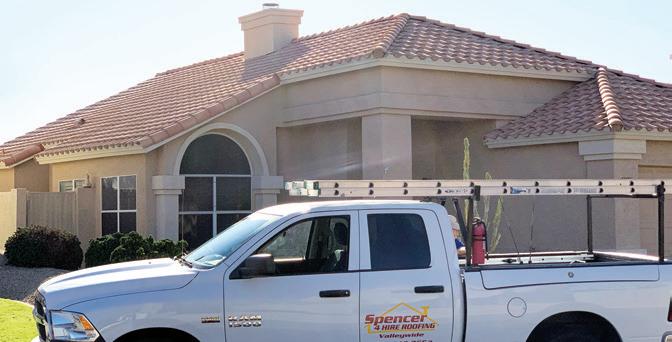






www.ahwatukee.com








www.ahwatukee.com
Phoenix and the University of Arizona are conducting a study aimed at answering what some city officials call a profoundly complex question:
Can adjusting the time that a traffic signal stays yellow reduce the thousands of incidents of red-light running that occur throughout the city on a daily basis?
Those incidents have proven costly in many ways, city Street Transportation officials told council’s Transportation, Infrastructure and Planning Subcommittee Jan. 18 and in memos submitted to Council by the department and Deputy City Manager Mario Paniagua.
During a study of 12 Phoenix intersections between Sept. 1 and Nov. 1, “a total of 144,795 RLR (red light running) incidents were observed,” they said.
Between 2014-20, red-light running crashes in Phoenix took 113 lives and injured 9,320 people. An Insurance Institute for Highway Safety report showed that in 2020 alone across the nation, red-light runners caused 928 deaths and 116,000 injuries to pedestrians, passengers and motorists.
Data so far derived from special sensors installed at 12 of the most dangerous in-
BY PAUL MARYNIAK AFN Executive EditorIt was a time to learn about Ahwatukee’s history from some of the people who made it and, in one poignant moment, a time to honor and thank one of the community’s most influential “founding fathers.”
About 200 people turned out Jan. 21 at the Ahwatukee Recreation Center for the first of three presentations on Ahwatukee’s history that the ARC is offering to the public free of charge as it celebrates its 50th anniversary.
With Ahwatukee historian Marty Gibson narrating, the group was enthralled by stories of the community’s early years by three significant contributors to its growth: Mark Salem, who owned
Ahwatukee first gas station; Rick Savagian, who as founder-owner of Mountainside Martial Arts Center owns the community’s oldest single-owner business; and Bruce Gilliam, president of Presley Development Company of Arizona – which built the community’s first subdivisions.
But the afternoon also became a celebration and a time to thank one of Ahwatukee’s most influential early settlers – Clay Schad, founder and longtime owner of the Ahwatukee Foothills News.
With his wife Jackie Schad at his side, Schad was surprised by an award from the ARC thanking him “for his tremendous support in establishing the community of Ahwatukee.”
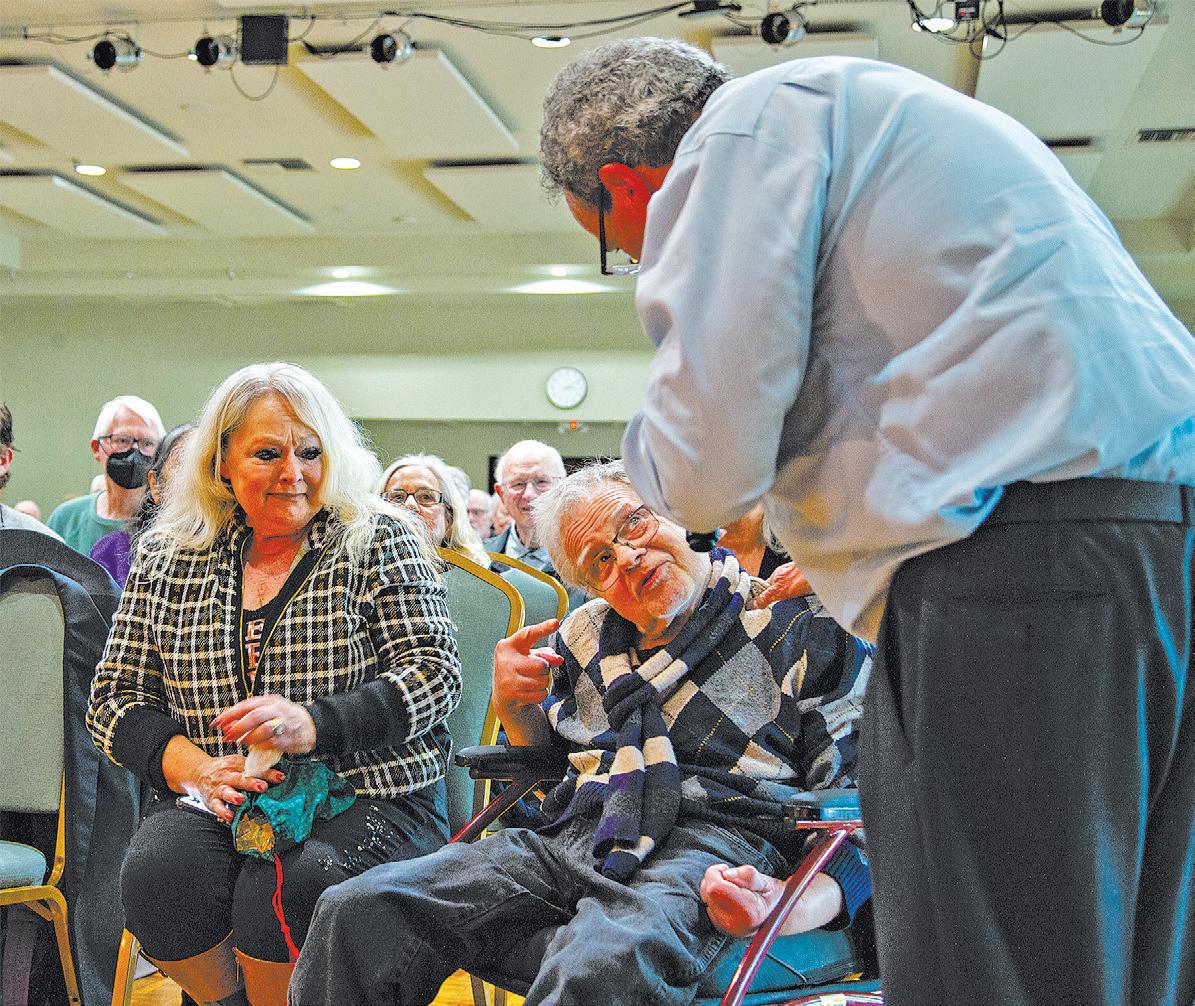
Ahwatukee Realtor Chad Chadderton presented Ahwatukee Foothills News founder and longtime owner Clay Schad with an award from the Ahwatukee Recreation Center that thanked and praised him “for his tremendous support in establishing the community of Ahwatukee.” A longtime friend of Schad, Chadderton made the presentation during the first of three sessions on the history of Ahwatukee that are being offered for free to the public by the ARC in commemoration of its 50th anniversary. (David Minton/AFN Staff Photographer)






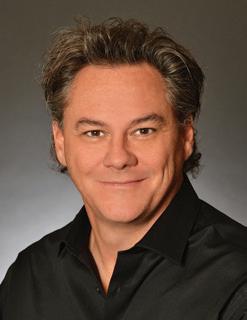
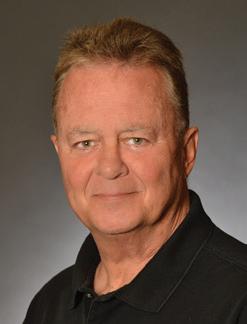

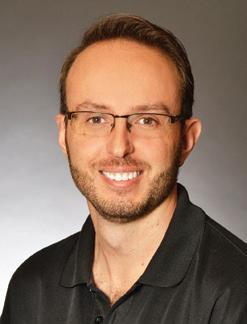


Simply stated our ultimate goal is to get you the most amount of money possible for the home you sell or the best deal on the home you buy. NO lowball investor o ers, NO bait and switch, NO false promises to sell your home in 3 days, just simple hard work and negotiating skills by the most experienced professionals in the industry on your side that also own a construction company. It’s almost unfair! Use the Number One Realtor in the entire city for multiple years in a row, not just in Ahwatukee, or in a branch o ce somewhere, but the entire city. CANAM o ces are right here in Ahwatukee where the owners live and work every day.





























The Ahwatukee Foothills News is published every Wednesday and distributed free of charge to homes and in single-copy locations throughout Ahwatukee Foothills.
Times Media Group:
1900 W. Broadway Road, Tempe, Arizona, 85282 Main number: 480-898-6500
Advertising: 480-898-5624
Circulation service: 480-898-5641
PUBLISHER
Steve T. Strickbine
VICE PRESIDENT
Michael Hiatt
ADVERTISING STAFF
National Advertising Director
Zac Reynolds 480-898-5603 zac@ahwatukee.com
Advertising Sales Representatives:
Laura Meehan, 480-898-7904, | lmeehan@ahwatukee.com
Katie Mueller, 480-898-7909 kmueller@TimesLocalMedia.com
Classifieds/Inside Sales:
TJ Higgins, 480-898-5902 tjhiggins@TimesLocalMedia.com
Steve Insalaco, 480-898-5635 sinsalaco@TimesLocalMedia.com
Executive Editor:
Paul Maryniak, 480-898-5631 pmaryniak@ahwatukee..com
GetOut Editor:
Christina Fuoco-Karasinski, 480-641-4518 christina@TimesLocalMedia.com
Sports Editor:
Zach Alvira 480-898-5630 | zalvira@TimesLocalMedia.com
Design/Production Coordinator:
Shannon Mead smead@TimesLocalMedia.com
Designer:
Ruth Carlton | rcarlton@TimesLocalMedia.com
Photographer:
David Minton | dminton@TimesLocalMedia.com
Reporters:
Cecilia Chan. 480-898-5613 | cchan@@TimesLocalMedia.com
Circulation Director:
Aaron Kolodny 480-898-5641 | aaron@phoenix.org
Distribution Manager Brian Juhl brian@TimesLocalMedia.com
Ahwatukee Foothills News is distributed by AZ Integrated Media, a circulation service company owned by Times Media Group. The public is limited to one copy per reader. For circulation services please contact Aaron Kolodny at aaron@phoenix.org..

To start or stop delivery of the paper, please visit: https://timespublications.com/phoenix/ or call 480-898-7901
To get your free online editiona subscription, please visit: https://www.ahwatukee.com/e-subscribe/
WRITE A LETTER
To submit a letter, please include your full name. Our policy is not to run anonymous letters. Please keep the length to 300 words. Letters will be run on a space-available basis. Please send your contributions to pmaryniak@ahwatukee.com.
EDITORIAL CONTENT
The Ahwatukee Foothills News expresses its opinion. Opinions expressed in guest commentaries, perspectives, cartoons or letters to the editor are those of the author.
ADVERTISING CONTENT
The content and claims of any advertisement are the sole responsibility of the advertiser. The Ahwatukee Foothills News assumes no responsibility for the claims or content of any advertisement.
© 2023 Strickbine Publishing, Inc.
Two Ahwatukee women who campaigned for nearly two years for pickleball courts at Desert Foothills Park last week celebrated a partial victory when the city completed the conversion of two tennis courts to also accommodate the popular sport.
While the city Parks and Recreation Department didn’t give Realtor Jill Ostendorp and physical fitness-dance instructor Carrie McNeish all they had been lobbying for, the two women were happy that the city finally answered their plea to some degree.
But Ostendorp said, “We’re taking this as a win but we’re not done.”
She and McNeish picked up hundreds of supporters since they launched their campaign in June 2021 and they are soliciting more residents to join them in pressing the city to finish the 25-year-old park itself – and include dedicated pickleball courts in the project.
“We are looking into how to get more community members informed and involved to keep the monies we have generated to be spent in our community,” said McNeish.
She and Ostendorp contend the city has failed to spend impact fees from new construction in the area over the years to finish the park.
In fact, theys aid, the city is soliciting suggestions from people in other parts of Ahwatukee for suggestions on how to spend about $400,000 in impact fees it has earmarked for Ahwatukee projects.
Interested people can write them at dfparkpb@gmail.com.
The two women said they’ve also learned some important lessons about dealing with City Hall that they will use as they continue their campaign for finishing the park to include more amenities and pickleball-only courts.
They’ve contended throughout their campaign that pickleball players in western Ahwatukee have no other nearby courts – and note the city’s own survey should 87% of residents in the area







of the park want pickleball courts.
McNeish and Ostendorp have noted that the pickleball complex at Pecos Park gets booked up fast – often by people who don’t even live in Phoenix.
Within days of the opening of the dual-use courts last week, people were lining up to use them for pickleball.
“There was a lot of activity,” Ostendorp said. “It was kind of exciting.”
Both women say that the dual-use courts, while better than nothing, favor tennis over pickleball – partly because the court lines for pickleball are difficult to see and partly because the height of the nets isn’t adjustable.
“What I guess is frustrating for me the most is that … we volunteered to help and provide any research, provide experts and they just said, ‘No, we’ve got this,’” Ostendorp said.
She explained that when she brought up the issue of the lines, parks officials told her that was standard for all dualpurpose courts in Phoenix.
When she learned there are only four such courts in the entire city, Ostendorp
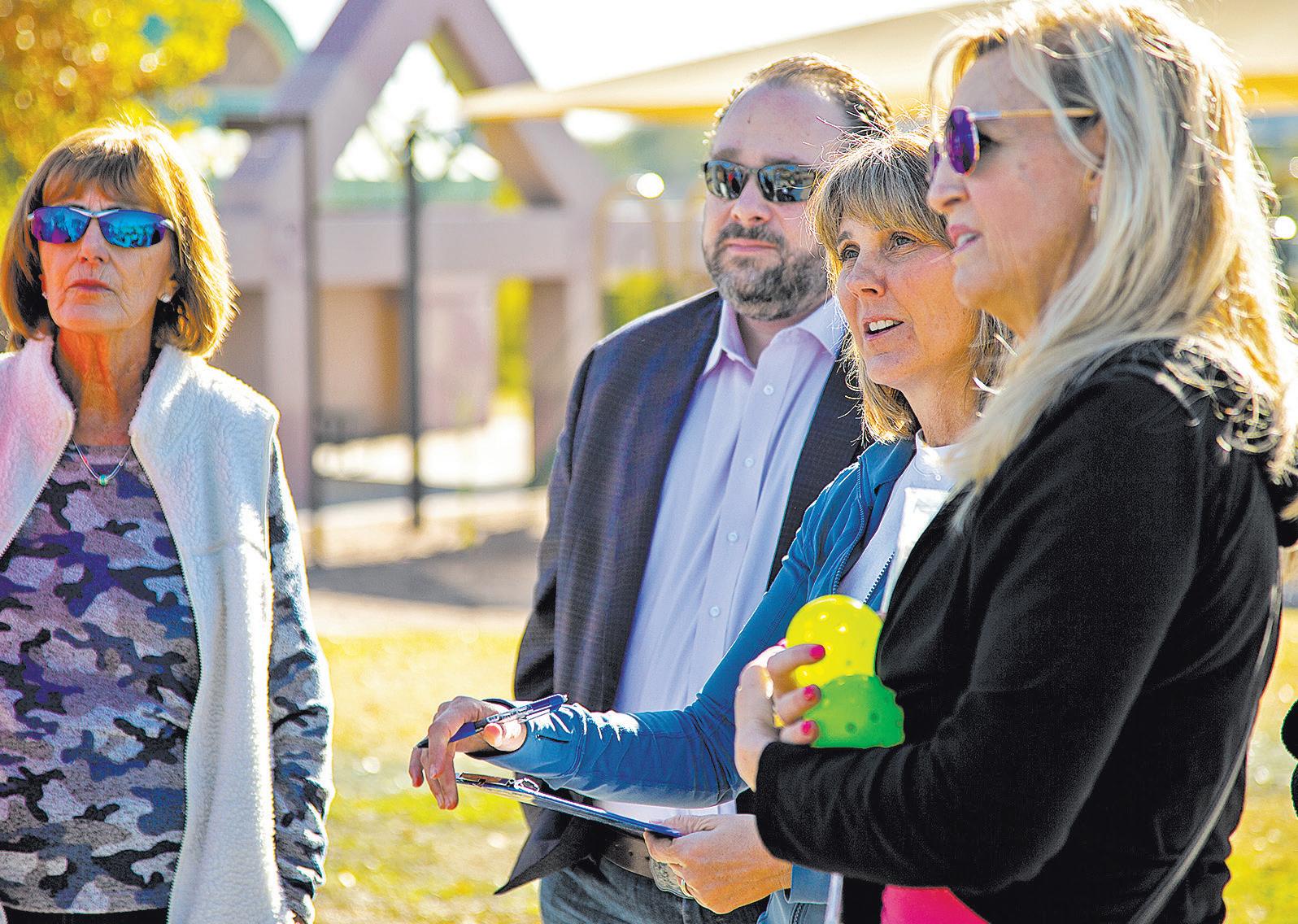
said she asked them “if there’s only four, then can’t we be the guinea pig and do it a little differently?
“You’re not talking like 400 standard-




“The city stated that basically what we see is the extent to what they are doing for us on these courts – minus a couple of things they are ‘looking into,’” McNeish said.
In an update to their supporters, Ostendorp listed the city’s various improvements, noting that wind barriers had not been installed but that the city said it would consider.
She also said new LED lighting “will be installed in approximately eight months as part of an overall city initiative” to upgrade lighting in parks and other public facilities. She was encouraged that parks personnel indicated they would give that lighting in Desert Foothills’ court area a high priority once the overall project is launched.
“In the meantime, the current lights are getting new clear coverings and any damaged bulbs will be changed out,” she added.
ized. We’re not trying to make computer chips. We’re trying to play some pickleball.”
The city’s response frustrated them.
While the two women stressed their gratitude, McNeish lamented, “It should not be this hard to work with the city council to get some positive changes to your community.”

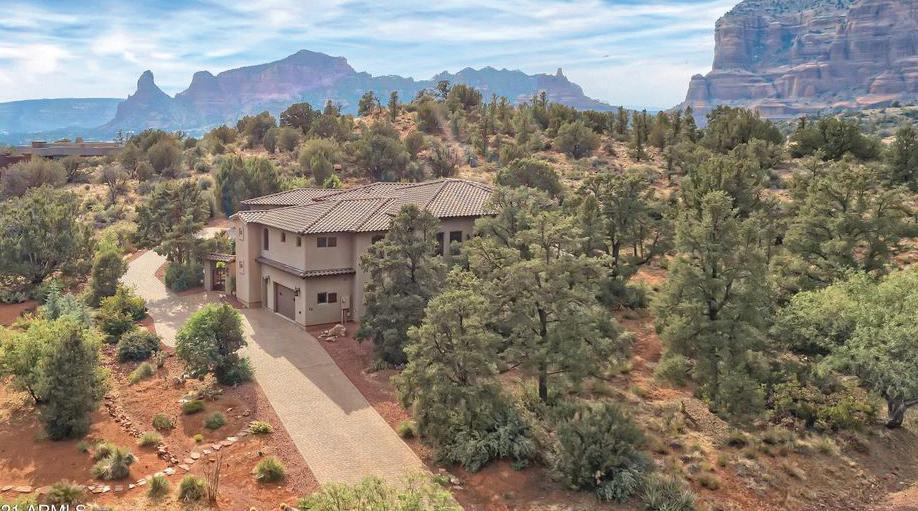


ARepublican state senator from Mesa’s personal experience with mental illness and homelessness derailed a bid by another GOP lawmaker, a former cop, to make sleeping on a sidewalk a state crime.
Sen. David Farnsworth’s extended comments about his struggles led the chairman of a Senate committee to pull Fountain Hills Sen. John Kavanagh’s proposal from consideration during a hearing this past week. Farnsworth described how a breakdown led him to leave his family home and travel to Seattle, where he lived on the streets and spent time in a homeless shelter.
“And it was a very educational experience for me because I came to the conclusion that mental illness like physical illness can come on any of us and we can heal from it,” Farnsworth said, saying he had panic attacks and was unable to live at home.
“As an adult with children, I ran away from home, so to speak, went up to Seattle, spent weeks up there sitting next to a park,” he said. “During that time period, I was homeless even though I owned a home in Mesa.”
Farnsworth spoke during discussions on Kavanagh hís plan to make it a toplevel misdemeanor for someone to sleep, lie down or sit on a street, sidewalk or other public right of way. Kavanagh’s proposal mirrors a Phoenix ordinance that is currently on hold because a federal judge blocked enforcement.
Federal courts have held that bans on sleeping in public can ít be enforced if there are not enough public shelter beds to house the homeless. Marilyn Rodriguez, a lobbyist for the American Civil Liberties Union of Arizona, told the committee that the ACLU sued over the Phoenix ordinance and if the proposal were to become law it likely would face a similar fate.
The number of homeless in the state ís two largest metro areas, Phoenix and Tucson, have grown significantly in the past five years. In Pima County, last year ís annual homeless count found more
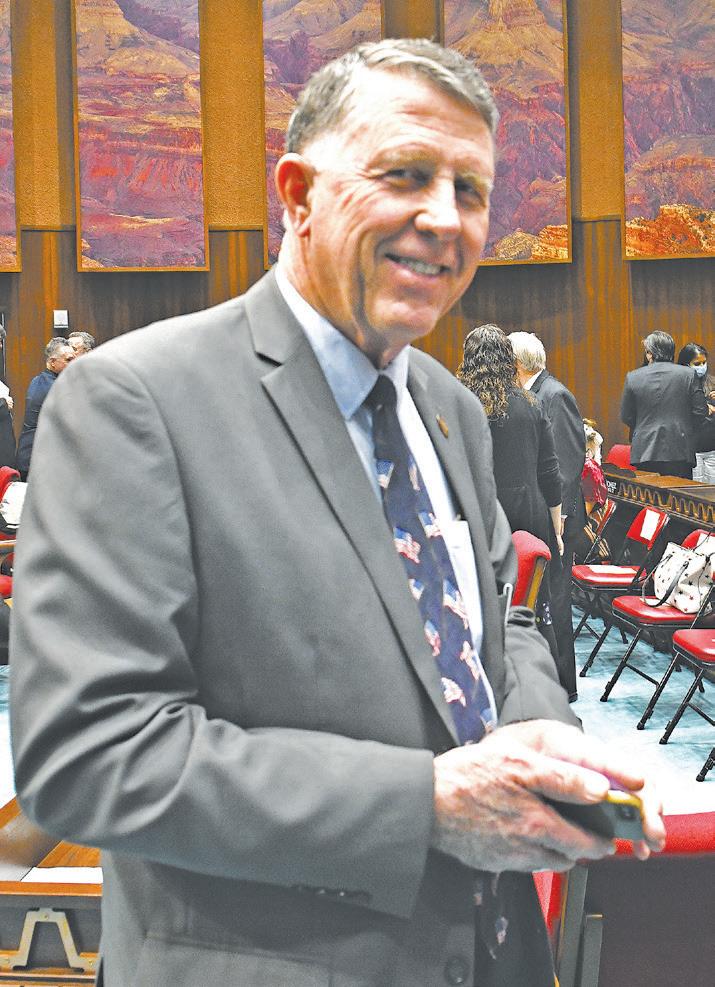

than 2,200 people did not have housing, compared to just under 1,400 in 2018. In Maricopa County during that same time period, the number of homeless grew from about 6,300 to more than 9,000.
Rodriguez noted that Phoenix has just 1,800 shelter beds.
But Kavanagh said in an interview with Capitol Media Services that there are often shelter beds available and that the homeless could go to parks or other public areas rather than camping out on the street if there are not open beds. And he noted that the Legislature earmarked $5 million last year for cities to build temporary shelters and Phoenix is not using that money.
“I think it’s because they don’t want to trigger having to clear their streets and parks,” he said.
Losing the support of any Republican in either chamber spells doom for any legislation that lacks Democratic backing, since the GOP has only onevote majorities in both the House and Senate. And even if bills make it out of the Legislature, Democratic Gov. Ka-

















“We are hoping that whoever ends up being our councilman will be willing to work with us and be an advocate for our project,” she said.
Sam Stone, who is vying with former Phoenix Assistant Police Chief and Ahwatukee resident Kevin Robinson for the city council seat that includes Ahwatu-
kee, was on hand for the two women’s meeting with city parks officials at Desert Foothills last week.
Stone takes a shot at the city’s handling of the project in his column today in FN’s Opinion section, and the two women praised involvement on their behalf right from the start of their cam-
see
page 17





tie Hobbs may hit them with her veto stamp, which she has said she is ready to wield as often as needed.
The Legislature has a series of proposals to deal with homelessness, including an effort from Rep. David Livingston, R-Peoria, that would force homeless people to live in dedicated spots, bar sleeping elsewhere and require the state housing department to dedicate money to creating camping locations.
Livingston was not available for comment Friday. His bill, which failed to advance in the past two years, is set for a hearing on Monday.
New Democratic Gov. Katie Hobbs’ executive budget also takes on the crisis in homelessness by putting $150 million into the state housing trust fund, money that can be used for homeless shelters, rental and utility assistance and to leverage federal funds to build new affordable housing.
The trust fund has been mainly neglected since its funding was stripped during the Great Recession, although it got a $60 million infusion last year when lawmakers doled out hundreds of millions in surplus cash.
Cities are struggling with how to deal with the homeless.
Phoenix faces a lawsuit from business owners near a sanctioned homeless encampment known as “The Zone,” a halfmile from the state Capitol, seeking to declare the area a public nuisance.
In Tucson, advocates for the homeless filed suit last week seeking to bar police from conducting clean-up sweeps of encampments ahead of the annual Gem and Mineral Show, a huge tourist draw. The city also faces pressure to address the issue from business
and civic groups who say it is a threat to public safety and business.
The sidelining of the ban on sidewalk sleeping was the second Kavanagh bill that hit a roadblock this past week in the Senate Committee on Military Affairs, Public Safety and Border Security chaired by Sen. David Gowan, R-Sierra Vista.
His other measure would have made it a crime to solicit for money in a raised or marked median, something that the longtime lawmaker calls dangerous. Kavanagh has tried for years to pass legislation that would prohibit asking for cash at freeway off-ramps or intersections, only to see those efforts fail.
The latest prohibition on begging in a median was pulled from consideration after Gowan amended it to allow people to sell items from the center of the street, a change that Kavanagh did not support.
Kavanagh’s bill on homeless sleeping on sidewalks is unlikely to be revived, at least in its current form, unless Kavanagh is able to change Farnsworth’s mind. But that possibility remains remote at this point.
“The homeless problem is a big problem that we need to address,” Farnsworth said.
“I’m not sure this is the way to do it,” he continued. “In fact, I’m not comfortable in addressing it this way.”





wait


























Sicans with Disabilities Act not to to block access.
Signs are limited to 32 square feet, or half that size in areas zoned for residential use.







en. Steve Kaiser has introduced legislation that could make him a hero of Arizona motorists -- assuming it gets approved and survives a likely court challenge.
The Phoenix Republican wants to ban political signs from street corners, medians and other public rights of way. Kaiser said SB 1116 simply does what his constituents want.
“They hate those things,’’ he told Capitol Media Services.

“They cause a ton of bad traffic because you can’t see around them, people put them in the wrong spot,’’ Kaiser explained. “It creates a ton of trash.’’
They can be erected no earlier than 71 days before the August primary and must be taken down 15 days after the election.
And they can’t be placed along state highways or overpasses.
Kaiser, for his part, believes the simpler solution would be to ban them all.
Nothing in SB 1116 would keep residents and businesses from putting signs on their own private property. But it still may run afoul of the First Amendment.


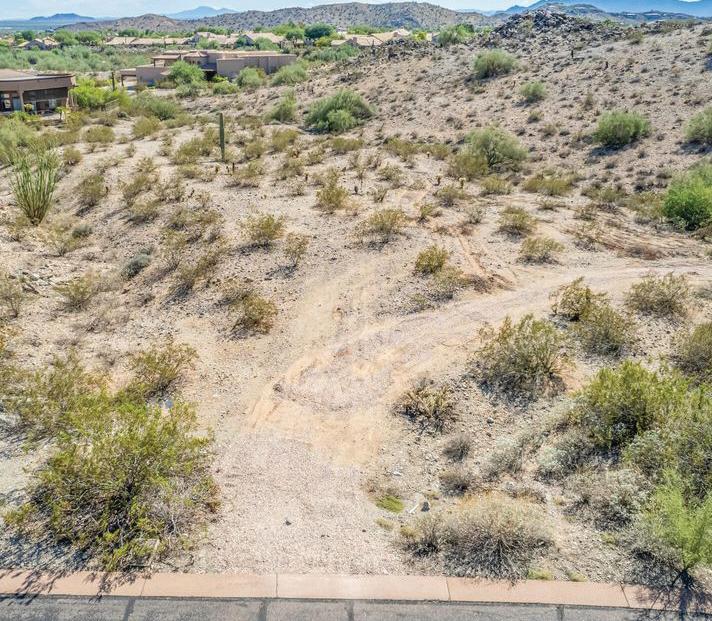

And then they can get defaced “and everybody freaks out.’’
What they also are, Kaiser contends, is unnecessary.
“It’s the least effective way to reach voters,’’ he said. Kaiser said text messaging and digital ads are both more effective and cheaper.
Yet Kaiser, in his 2020 and 2022 campaigns, put up signs around his district.
The key is the fact that, as Kaiser acknowledges, his legislation outlaws only political signs on public rights of way. But signs still could be erected at those same intersections to advertise everything from new subdivisions to yard sales and even church services.
Gilbert found out the hard way that picking and choosing what signs are acceptable is not legally acceptable. That case stems from the fact that the Good News Community Church, like many small congregations, had no buildings of its own.
Curch officials put up signs directing would-be worshipers to the site.

“If my competitor’s going to do it, of course I’m going to do it,’’ he explained. Of course, that war of escalation only increases the number of signs that pop up along the roads.
Kaiser also denied that banning these signs becomes an incumbency protection act, denying challengers the ability to create the same name ID that those in office may already have. Instead, he said, the effect would be the opposite.




“Incumbents usually have the most signs and have better funding to carpet bomb an area,’’ Kaiser said. “They also are better organized and know exactly when to place and where to place, and usually have professionals doing it for hire.’’
While it may not seem like it to the average motorist, there actually already are state laws designed to deal with the biennial crop of campaign signs.
They cannot be placed in a location that is hazardous to public safety, obstructs clear vision in the area of interferes with the requirements of the Amer-
Gilbert said the signs could not be erected earlier than 12 hours before the event and had to be removed one hour after services ended. And the rules limited the signs to no more than 6 square feet.
By contrast, political signs could be 32 square feet and remain in place for months. And even what the town called “ideological signs’’ could be permanent and up to 20 square feet.
Town officials argued there were legitimate reasons for the time limits on church signs, ranging from public safety to blight. But Justice Clarence Thomas, writing for a unanimous Supreme Court in 2015, called that legally irrelevant.
“Innocent motives do not eliminate the danger of censorship presented by a facially content-based statute, as fu-
As he presented the award to his decades-long friend, Ahwatukee Realtor Chad Chadderton recalled how he was sitting in the backyard with Schad one evening in 1988 and mentioned that no one had picked up the Independence Day fireworks show that developers once sponsored as a way to lure prospective homebuyers to the community.
“And he said to me, ‘why don’t you do the fireworks show?’ And I said, ‘I don’t know anything about fireworks.’ He said, ‘Well your network: you know people. I’ll back it up with the paper.’
“And from ‘88 for 10 years, I did the fireworks show. Thanks to Clay, when we finished up we had the third largest firework show in the state. It’s all to Clay.”
That wasn’t all that was “all to Clay,” Chadderton and the other speakers told the audience about Schad, who started the paper in 1978 and grew it from a single sheet of tidbits of information on community happenings into an Ahwatukee institution that he oversaw until he sold it in the late 1990s to Thompson Newspapers. At that time, the corporation also bought the Mesa Tribune and several other East Valley weeklies.
Chadderton recalled how he used to accompany Schad as he delivered the papers from a pickup truck.
And when he wasn’t delivering papers or selling ads, he said, Schad was hustling stories in support of businesses
and organizations in the community that were going through their own birth pains.
“He helped us with many things,” Chadderton told the audience. “We mentioned the Jaycees – it was a really good service organization that was here in the 70s and 80s. And he always gave us good coverage. When we started Kiwanis, he gave us coverage – and for the Toastmasters Club, the Optimists Club. Clay was always there.”
Gibson’s other three guests wholeheartedly agreed.
Savagian recalled how, as the first director of the Ahwatukee Community Center, he wanted to start a “continuing education program for swimmers to go on to the next level and Clay consistently gave us that front page.
“Clay was so instrumental in the building of our karate program,” Savagian continued. “We got a lot of front page news on the karate program because our students started performing at very high levels and competing at high levels and doing extremely well.”
He also publicized the dozens of runs and races Savagian organized that put Ahwatukee on the map for nearly a decade as a runner’s Mecca.
“Clay’s coverage literally had major sponsors coming to us,” he added.
Salem said, “Everybody that was open, we used Clay. We did our ads with Clay,
























SELLER WILLING TO PARTICIPATE IN A RATE BUY DOWN!



Mountain Park Ranch Listed for $449,999
Move in ready 1,594 sf 3 bedroom, 2.5 bathroom home with north / south exposure! Kitchen is beautifully remodeled (November 2022) with quartz counter tops, professionally refinished cabinets, new cabinet hardware and new stainless steel appliances.
Mesa, AZ – When it comes to chronic pain and/ or neuropathy, the most common doctor-prescribed treatment is drugs like Gabapentin, Lyrica, Cymbalta, and Neurontin.
The problem with antidepressants or anti-seizure medications like these is that they offer purely symptomatic relief, as opposed to targeting and treating the root of the problem. Worse, these drugs often trigger an onset of uncomfortable, painful, and sometimes harmful side effects.
The only way to effectively treat chronic pain and/or peripheral neuropathy is by targeting the source, which is the result of nerve damage owing to inadequate blood flow to the nerves in the hands and feet. This often causes weakness, numbness, balance problems. A lack of nutrients causes the nerves degenerate – an insidious

patio area off the kitchen, a large grass area, extensive hardscape, fire pit, and a sparkling pebble tec pool.
As displayed in figure 1 above, the nerves are surrounded by diseased, withered blood vessels. A lack of sufficient nutrients means the nerves


cannot survive, and thus, slowly die. This leads to those painful and frustrating consequences we were talking about earlier, like weakness, numbness, tingling, balance issues, and perhaps even a burning sensation.
The drugs your doctor might prescribe will temporarily conceal the problems, putting a “Band-Aid” over a situation that will only continue to deteriorate without further action.
Thankfully, Mesa is the birthplace of a brandnew facility that sheds new light on this pressing problem of peripheral neuropathy and chronic pain. The company is trailblazing the medical industry by replacing outdated drugs and symptomatic reprieves with an advanced machine that targets the root of the problem at hand.

Effective neuropathy treatment relies on the following three factors:
1. Finding the underlying cause
2. Determining the extent of the nerve damage (above 95% nerve loss is rarely treatable)
3. The amount of treatment required for the patient’s unique condition
Aspen Medical in Mesa, AZ uses a state-of-the-art electric cell signaling systems worth $100,000.00. Th is ground-breaking treatment is engineered to achieve the following, accompanied by advanced diagnostics and a basic skin biopsy to accurately analyze results:
1. Increases blood flow
2. Stimulates and strengthens small fiber nerves
3. Improves brain-based pain
The treatment works by delivering energy to the affected area(s) at varying wavelengths, from low- to middle-frequency signals, while also using Amplitude Modulated (AM) and Frequency Modulated (FM) signaling
It’s completely painless!
THE GREAT NEWS IS THAT THIS TREATMENT IS COVERED BY MEDICARE, MEDICAID, AND MOST INSURANCES!!
Depending on your coverage, your peripheral neuropathy treatment could cost almost nothing – or be absolutely free.
The number of treatments required varies from patient to patient, and can only be determined following an in-depth neurological and vascular examination. As long as you have less than 95% nerve damage, there is hope!
Aspen Medical begins by analyzing the extent of the nerve damage –a complimentary service for your friends and family. Each exam comprises a detailed sensory evaluation, extensive peripheral vascular testing, and comprehensive analysis of neuropathy findings.
Aspen Medical will be offering this free chronic pain and neuropathy severity evaluation will be available until January 31st, 2023 Call (480) 274-3157 to make an appointment
Due to our very busy office schedule, we are limiting this offer to the first 10 c allers Y OU DO NOT HAVE TO SUFFER ANOTHER MINUTE, CALL (480) 274-3157 NOW!!
We are extremely busy, so we are unavailable, please leave a voice message and we will get back to you as soon as possible.





















































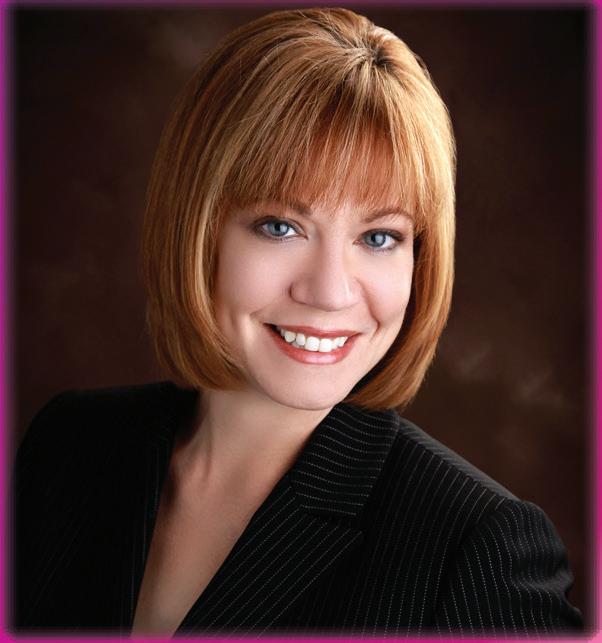







ture government officials may one day wield such statutes to suppress disfavored speech,’’ he said. “That is why the First Amendment expressly targets the operation of the laws – abridgment of speech – rather than merely the motives of those who enacted them.’’
Kaiser called it “an interesting question’’ of whether the state could do what he pro -
we talked about our hours of operation. He would oftentimes take our ideas and we put them down on paper and he changed them for the better because we weren’t media people – he was.
“He’s directly responsible for Millie’s (Hallmark store) and Circle K and much of the Presley activities,” Salem continued. “One of the biggest things we did that made a difference for us is we got Clay to put in a (newspaper) rack. So once a week, he would bring the magazines and put them in the rack and then people would flood the gas station to get them. And so he helped drive business in that way.”



poses and single out only campaign signs for special treatment. But, for the moment, he has no interest in expanding the scope of his measure to impose similar prohibitions on other signs at street corners and in public rights of way.
“I really just want to focus it on political signs because it gets out of hand, it gets crazy,’’ Kaiser said.
His legislation has not yet been assigned to a committee.
Speaking via Zoom from his Colorado home, Gilliam recalled how he and other Pressley employees would give Schad articles and ask him to turn them into fliers for circulation among the few hundred homes that existed in Ahwatukee at the time.
“And then I think we came in one day and started talking about the newspaper,” said Gilliam, who asked his father, a newspaper publisher in California, if he’d like to start a newspaper in Ahwatukee.
He declined.
“So Clay, having produced these things was a logical choice for me,” Gilliam said. “And when I went to Clay, he’d have a lot of good ideas on how to make it better. And I said, “I know you’re going to need some support and we’ll give you that, but I’d rather give it to you in ads in the paper, rather than just cash subsidies. But we probably did a little both.
“And he took it from there and just fire-stormed that thing and made it into some great newspaper that I just never imagined.”
Physically unable to say much, Schad appeared overwhelmed by the tributes, saying “It was very important for me to be part of it.”














































State lawmakers took the first steps last week to denying students the right to be referred to by a pronoun that matches how they identify themselves.
SB 1001, approved by the Senate Education Committee on a 4-3 party line vote, also would put into law that teachers and other school employees may refer to a student by only his or her given name or a nickname “commonly associated with the student’s name of record.’’ Sen. John Kavanagh, R-Fountain Hills, who crafted the measure, said it would be OK to refer to someone named John as Jack.
“You just can’t call ‘John’‘Jane,’‘’ he said.
The legislation does contain an exception in cases where parents first give written permission, whether for a different pronoun or even a name to address the child. Kavanagh said that should take care of cases where parents are aware of and approve of a child’s preference.
Kavanagh said this isn’t about discriminating against transgender children. Instead, he said, it ensures that parents
know when a child may have “gender dysphoria’’ where the gender selected differs from the gender assigned at birth.
“The parents have a right to know about serious problems their children may be having,’’ Kavanagh argued, problems that could lead to suicide.
Paul Bixler, a member of Liberty Elementary School District Governing Board, said that’s fine for children who have a loving relationship with their parents. But he said this legislation fails to understand reality.
“There continues to come before this legislature efforts to either force a child to disclose their deepest, darkest secret to a person, maybe even a parent, whose reaction a child cannot predict, trust -- or even fears,’’ Bixler said
Erica Keppler, an activist in the LGBTQ community, testified that SB 1001 is based on another flaw.
“No one commits suicide because they are gender dysphoric,’’ she said.
“They do it because family and society won’t accept them or allow them to live as their true selves,’’ Keppler continued. “Making schools even more
hostile environments for trans youth only promotes the problem the senator claims it will help.’’
Kavanagh brushed aside concerns that notifying a parent of that preference actually could put the student in danger of abuse or being thrown out of the house.
“That’s a very cynical view of the American family,’’ Kavanagh said.
Still, he said, if there is such a danger, then a parent could be contacted by a school counselor or even the Department of Child Safety. And if a child simply doesn’t want a parent notified, Kavanagh said, the answer is simple: He or she has to live with the pronoun and the name they were given at birth.
David Trujillo, a 15-year-old transgender student born and raised in Tucson, told sometimes it is the support of teachers and friends that helps.
“I know personally that, for me, my teachers and classmates supporting me in the classroom has positively impacted my performance in school,’’ he said.
But Heather Rooks, a member of the Peoria Unified School District board, said measures like this are important.
“Why are we so focused on the sexualization of these kids?’’ she asked. “We need to focus on the academics right now.’’
Sen. Justine Wadsack, R-Tucson, said something is lost in the discussion of the rights of transgender students to be addressed the way they want.
“You’re not talking about the other students who don’t, and the other students who actually are being forced in the classroom to use pronouns that they don’t understand, that they don’t feel comfortable using,’’ she said. “And then they’re getting punished for not using them.’’
One provision in Kavanagh’s bill could create problems even for supporters.
It says teachers and school employees with religious objections can’t be forced to use a student’s preferred pronoun, even in situations where the parents have given permission.
Sen. Ken Bennett, R-Prescott, who voted for the legislation, said he believes that the wishes of the parents should always win out. And he said he may not vote for the measure when it next goes to the full Senate unless that is removed.

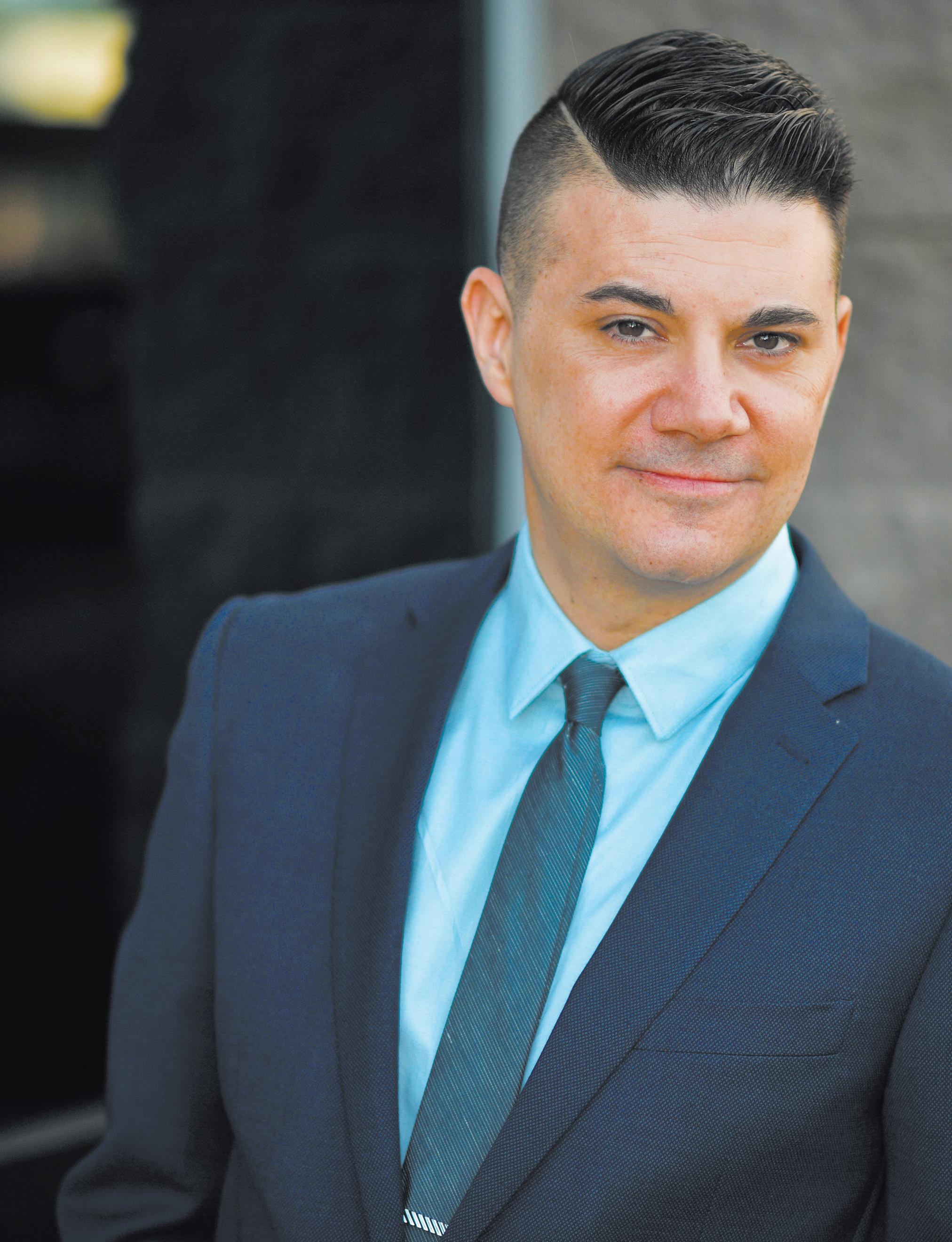

tersections in Phoenix suggested that thousands of motorists couldn’t care less when a light is red.
During a 12-week period, 128,164 motorists ran a red light and of that total, 16,631 – or 11.49% – did so after the signal had turned green for traffic opposite from where those red-light runners should already have stopped. At one intersection alone, 433 motorists ran the red light, including 28 when the signalwas green for opposing traffic.
While red-light running is a frequent complaint in Ahwatukee, it’s unclear whether any intersection in the community is part of the study.
Street Transportation officials said they based their selection at least partly on the Maricopa Association of Governments’ list of the 100 most dangerous intersections in the county. The closest to Ahwatukee is the intersection of 48th Street and Baseline Road, which MAG ranks the 69th most dangerous.
But Street Transportation spokeswoman Heather Murphy said the intersections are being kept secret.
“None of us are privy to the locations because an important factor to evaluate is whether drivers eventually change their behavior after the timing change is made,” she said. “The locations will not be disclosed for that reason.”
In what is the first study of its kind by a city, Phoenix officials hope that behavior changes, but are candidly skeptical as well.
A signal typically cycles through all directions in two minutes, with 15 seconds for dedicated left and right turns and 45 seconds each for east-west and northsouth through-traffic. Street Transportation Director Kini L.E. Knudson said a signal will stay red in all directions for a

Data accumulated during in 12 weeks from 12 city intersections showed the number of motorists who ran a red light, including a substantial percentage who did so when traffic in the opposite direction had a green light. (City of Phoenix)
few seconds so that any left-turning traffic will clear an intersection.
Street Transportation Assistant Director Briiana Velez explained that currently, a light stays yellow for left-turning traffic for three seconds at all city intersections. The Institute of Transportation
Engineers in 2020 suggested that time should be adjusted, ranging between 3.2 seconds for traffic in a 25 m.p.h.-zone to 5.2 seconds in a 50 m.p.h. zone.
The city wants to determine if adding those fractions of seconds will do any good.
Both he and some council members
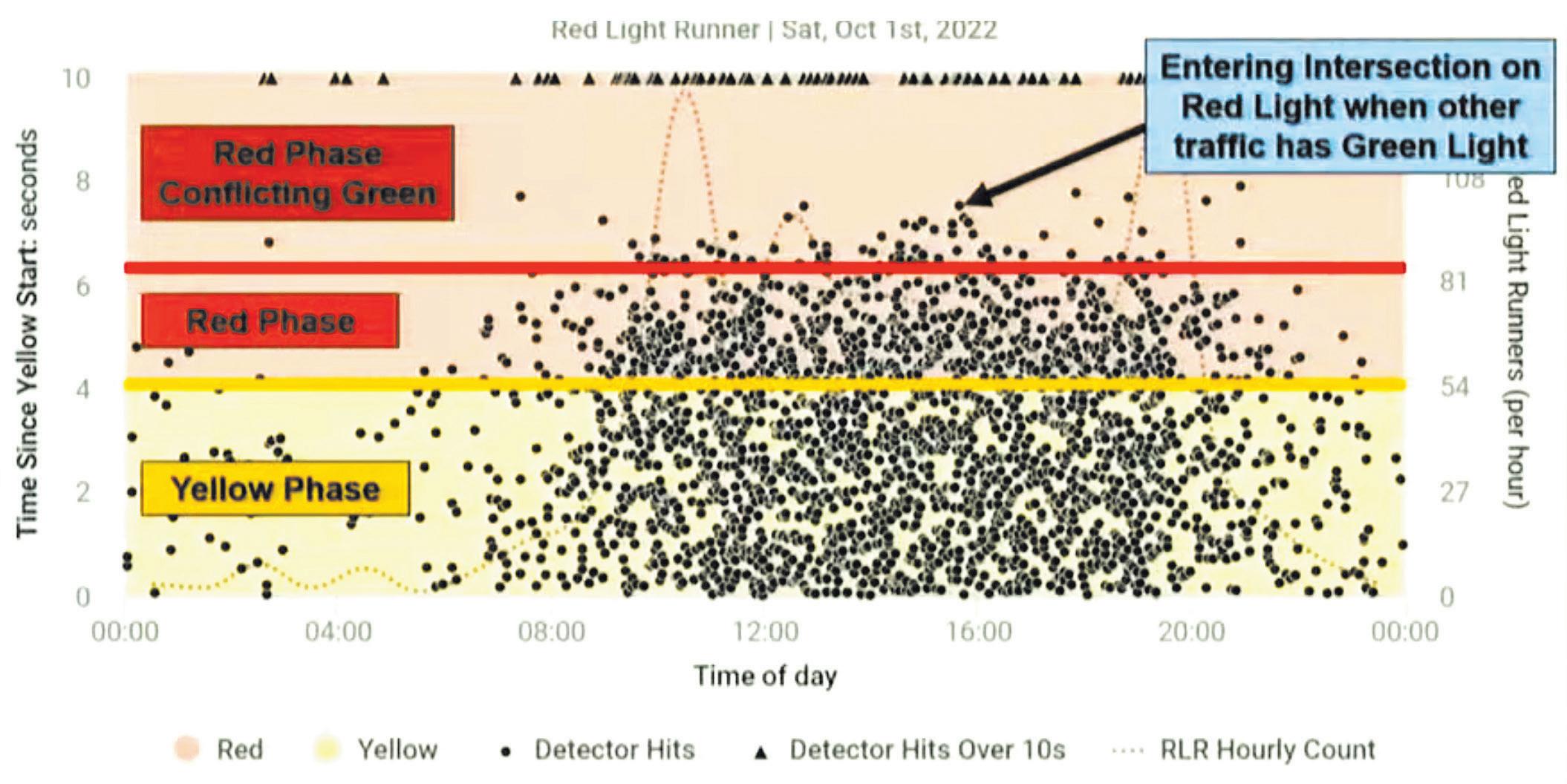
reiterated their skepticism during last week’s hearing, saying at the same time they are hopeful of getting results by the time the study is completed this spring.
“We all know human nature,” Knudson said. “The longer the cycle time, the longer someone may have to wait at a red light then the more frustration that person has and the more willingness that that person has to disregard the signal and run a red light.
“It gets somewhat more complicated than that,” he continued. “We’re not just talking about the timing of one signal light. We’re talking about the timing of 1,200 traffic signals across our 520-square-mile city. You are timing the signals as a system that works and coordinates together.”
Velez said the challenge is making intersections safer while “maintaining an acceptable level of operational efficiency.” She noted when it comes to adjusting yellow-light time, “part of the reason there is no broad consensus is the lack of field studies that have determined its actual effect on safety and efficiency.”
She said the study aims to further understand “the relationship between the signal timing changes and driver behavior” and whether the Institute of Transportation Engineers recommendations on extending yellow light length “can enhance the safety of signalized intersections and to evaluate potential efforts to reduce frequency of red-light running.”
Knudson said that his department is “concerned first and foremost about safety” but that “I’m agnostic at best when it comes to what the results of the studies are if it shows that we think that this has our safety impact to make our streets safer.
Each dot in this chart represents a motorist who went through an intersection on yellow, ran a red light when the signal was red in all directions and, in the uppermost portion of the chart, when traffic in the opposite direction had a green light. (City of Phoenix) see
“It makes sense for us to consider and
page 17









paign while he was still working as chief of staff for Councilman Sal DiCiccio.
They were especially grateful because they felt that DiCiccio was not very helpful to their broader cause, although his office did run some interference with parks officials when it came to getting the dual-court conversion done.
DiCiccio during a budget hearing last spring had noted his efforts to get the Pecos Park courts built and said Ahwatukee’s overall needs had to be balanced with those of the rest of District 6.
“We’ve had a lot of resistance from District Six, and I don’t know why,” Ostendorp said, adding she also understood DiCiccio “didn’t feel like he could go to these
to do this,” he said, “but we want to be able to be judicious about that and use that engineering judgment to see whether this is going to have the impact we expect.”
He said adjusting the length of yellow lights will have other consequences: “Either you’re going to have to increase the signal length of the overall signal at that intersection, or you’re going to have to reduce the green light and both those have impacts on our traveling public.” He also conceded, “Ultimately we can’t control behavior. If people get used to a
other council districts and ask for pickleball courts, when there were so many other major issues in so many other districts that were kind of more pressing.”
As they step up thjeir broader campaign for completing Desert Foothills Park, McNiesh and Ostendorp also are committed to implementing all they have learned as they navigated City Hall.
The biggest lessons the two women have learned so far, McNeish explained, include: “Get community support. Try and get a meeting with the councilperson.
“Attend the budget meetings. We also contacted every person on the city council and that helped when we could not get support from our own district. Be willing to stay the course.”
change to the signal timing, and then they still don’t have a feeling there’s a consequence to the action of red light running, whether that be an accident or a ticket or something else like that, our concern is that that will not necessarily control the behavior that we’re trying to get out there.”
Councilwoman Laura Pastor wished him luck, stating, “We have to change that behavior and at the end of the day, it’s enforcement. And I don’t want to go to enforcement. I want to I want to go to do the right thing. This is how we operate. …It’s so complex.”






















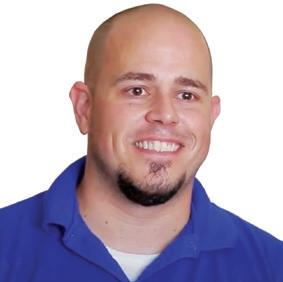



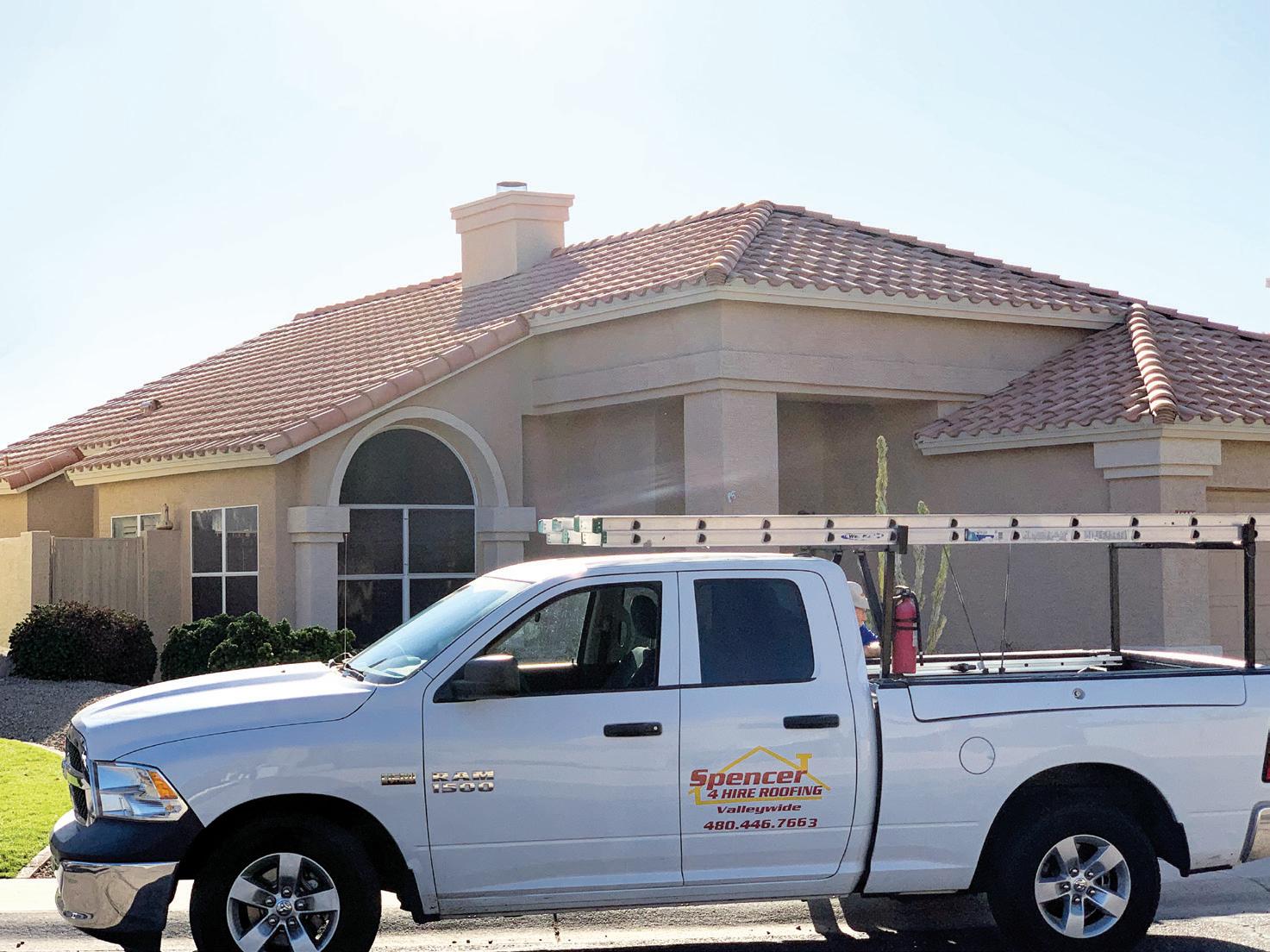


























Ayear and four months have passed but the death of his 15-year-old son Christian still gnaws at Bruce Petillo’s heart.
“We are devastated,” the Gilbert dad said. “You never come to terms with it.
“The fact that this was a preventable accident makes it worse.”
It was Labor Day weekend 2022 and Christian was at a friend’s house on a county island in Queen Creek.
The friend was showing off his mom’s handgun to Christian and other boys in a bedroom. As Christian held the gun, it went off, firing a 9mm bullet into his chest, according to the Maricopa County Sheriff’s report.
The high school sophomore was rushed to the hospital and later pronounced dead. The Maricopa County Medical Examiner determined the shooting was accidental.
The Petillos’ youngest child also left behind a brother and sister.
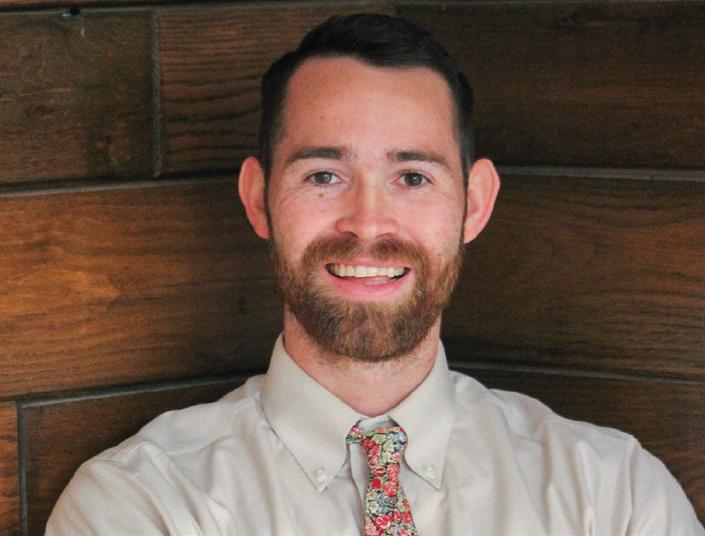

Thank you for your support!
Nicholas Goode Financial Advisor

“As parents you’re constantly looking to protect your children,” Petillo said. “I lay awake at night thinking about ‘what if.’
“Quite frankly we were supposed to be in Hawaii that weekend and postponed the trip because I got sick early in the week…and he went with friends and the accident happened.”
Petillo and his wife, Claire, have now channeled their grief into preventing needless deaths such as Christian’s.
The couple has formed the No DoOvers organization with the goal of stopping children from gaining unauthorized and unsupervised access to guns via education, advocacy and legislation. They’ve also set up a GoFundMe page to raise $10,000 toward that effort.
“One of the reasons we looked at this name for the foundation No Do-Overs is that children are going to make mistakes,” Petillo said. “Most of the time they have the opportunity to learn from them.
“When it comes to guns there are no do-overs and as we as parents look back, we know we can’t change what happened with Christian. There’s no do-over for us.







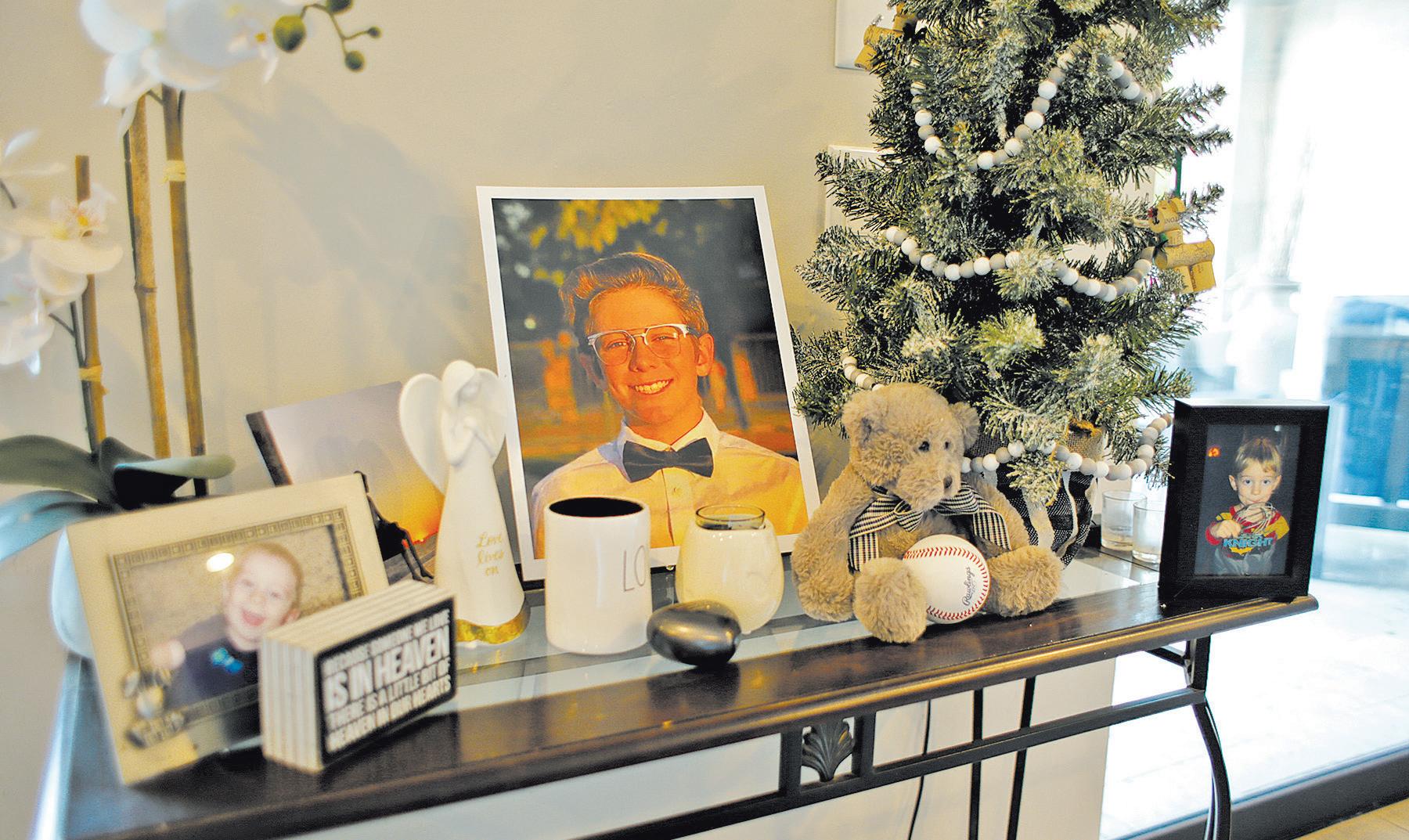
“We do know we can take what’s happened and save the next child, the next family from having to endure the same tragedy that we’ve endured.”
The organization is pushing a bill called Christian’s Law, which requires
gun owners to secure their firearms and ammunition and carries a $1,000 penalty for violation.
Petillo backed up the effectiveness of
































such a law by pointing to a report by the RAND Corp.
The nonprofit think tank found that child-access prevention laws or safe storage laws reduce self-inflicted fatal or nonfatal firearm injuries, including unintentional and intentional self-injuries, among youth and also reduce firearm homicides among youth.
State Rep. Jennifer Longdon, D-Phoenix, introduced HB 2192 on Jan. 12. Longdon is a long-time advocate for gun safety after she was paralyzed in a random drive-by shooting in 2004.
Christian’s Law is actually a resurrection of HB 2367, which Longdon introduced in the 2022 legislative session and was held up in the Republicancontrolled Rules Committee. Longdon introduced a total of 10 bills in the last session related to gun regulation, all of which were stalled in committees.
The three-term representative said she is unsure how this latest measure will fare.
“With dozens of new members and a new governor, I don’t know how to compare our chances to last year,” Longdon said. “These are often, you know, a very
long view with public policy and especially with common-sense gun safety. It’s just been too long.”
She added that as a survivor of gun violence, she - like the Petillos – isn’t going away.
“We’re going to keep pushing this for as long as it takes, for as long as we can because honestly, that’s what we should be doing,” she said. “This is an issue that has broad public support and it would absolutely save lives.
“But the reality is that the Republicans still control a slight majority and they overall are terrified of the power of the gun lobby, the extremist gun lobby. So even incremental common-sense changes are a huge challenge and require political courage and that’s a rare commodity around here.
“And so it takes courage of families like the Petillos and others to get this done. The issue isn’t going away. And neither are we.”
Fellow House Democrat Jennifer Pawlik, whose Legislative District 13 covers a part of Gilbert, is the bill’s co-sponsor.
“It’s a matter of being responsible and knowing where your guns are and making sure they are properly secured,”
If


Lynn





















Petillo said
children and teens are shot in the country.





Petillo pointed to recent stories in the Valley that’s occurred since Christian’s death such as in November when a 16-year-old boy was accidentally shot by a gun in Chandler that he and another 16-year-old boy were playing with.
In fact, in 2021, 56 children in the state died from a firearm injury and all of them were determined to be preventable, said Petillo, citing from the Arizona Department of Health Service’s latest annual child fatality report.
According to the nonprofit Brady: United Against Gun Violence, every day 22
“We have over 6,000 kids a year being injured or killed by guns and no other Western society deals with this,” Petillo said. “There are lots of really responsible gun owners out there. Unfortunately, there are also a significant number of gun owners who are not responsible.
“Responsible gun owners would be supporting this kind of legislation… because these are the types of things that will improve outcomes for kids and start reducing injuries and deaths in
GUNS from page 20
children associated with guns and actually help more of these gun owners be more responsible when they are not and help the gun industry. And ultimately it doesn’t infringe on anyone’s right to own a gun.”
Petillo acknowledged that some people may get “a little upset” when it comes to any sort of gun regulation but he compared the proposed legislation to laws on the book such as seat belt use and drunken driving – which save lives.
The Petillos also are working with the Song family in Connecticut on passing similar legislation nationally called Ethan’s Law, named after 15-year-old Ethan Song, who was fatally shot by an improperly stored gun at a friend’s house.
Petillo said friends are volunteering to help with the grassroots nonprofit and get the momentum going.
No Do-Overs will partner with other organizations for help in passing legislation, raise awareness and “help us educate and really draw attention to this,” Petillo said.
It will also lobby the technology industry to come up with solutions to provide more safety and security when it comes to firearms and kids, according to Petillo.
“All of us love our children,” he said. “And I think if we look at this from a human perspective and understand that this is a very small step that can actually save a substantial number of children’s lives without infringing on Second Amendment right, I think it makes sense.
“It can happen to anyone. This was not something we would ever think would happen to us. We didn’t have guns in our
Learn more and help
Gilbert parents Bruce and Claire Petillo have formed the No Do-Overs organization, which attempts to prevent unnecessarily gun deaths among children and teenagers. For more information, go to www. nodoovers.org.
The couple also has set up a GoFundMe page for the organization. To donate, go to gofundme.com and search “no do overs.”
home. It was just a personal preference. At the end of the day this is a human discussion.
“It’s really a matter of our children and doing what is right for them.”
Here is a summary of a bill that sponsor Rep. Jennifer Longdon, D-Phoenix, hopes will get a fair hearing by the Republican-controlled Legislature.
A. A person shall not store or keep a firearm or ammunition, or both, in any residence unless the person either:
1. Keeps the firearm or ammunition, or both, in a securely locked box or equips the firearm with a device that renders the firearm inoperable without a key or combination.
2. Carries the firearm or ammunition, or both, on his person or within such close proximity to his person that the person can readily retrieve and use the firearm as if it was carried on his person
B. A person who violates this section is subject to a civil penalty of at least $1,000.












Phoenix City Council on Jan. 18 directed city staff to begin de veloping tougher water conservation requirements for new developments.
Those requirements could include higher standards for pools as well as separate meters for them and all outside water use, a requirement that large consumers to recycle at least 30% of their water on site requirements for more detail on conservation plans in zoning applications.

But Councilwoman Laura Pastor also urged city staff to begin working on more rigorous conservation requirements for existing water users as well, stating, “we’re in a bigger crisis than what we think we are.”
“I also want to look at current development…and what industries we would like to attract that don’t require a lot of water usage,” she said.



Councilwoman Debra Stark agreed, telling Water Services and city planning staffers, “I think maybe as you go through the process, if you could just give us like a quarterly report on what you’re doing with your recommendation so we know what’s going on in new development, but then maybe regroup and discuss about what we can do for existing development because I agree that’s critical and I know we’re all under the gun and I know you guys probably feel it more than us.”
The hearing that followed an earlier memo to the council from Deputy City Managers Karen Peters and Alan Stephenson as well as the Water Services and Planning and Development departments, officials stressed that Phoenix “can no longer depend on receiving its full allocation from the Colorado River” and that “a supply sufficiency is likely in the future.”
“To adapt to a challenge of this magnitude, the City will have to embrace its heritage of water-problem solving,” they wrote. “Only by adopting institutional water conservation policies will the City be able to maintain a pattern of sustain-
City water officials said single-family homes comprise the biggest users of water and as much as half that use involves swimming pools and irrigation. (City of Phoenix)
able growth and efficient water use.”
During the hearing, city Water Conservation Coordinator Maxwell Wilson, said the city already is looking to further strengthen conservation measures already in place for all users.
He explained that single-family homes comprise the single largest group of water consumers in Phoenix and that water outside homes represents a third to a half of all water they use.
He said the city already running programs aimed at encouraging voluntary water conservation and that one includes working directly with landscapers.
Wilson also said the city is working with homeowners to encourage replacing grass with turf, although Pastor expressed concern about those recommendations, noting some types of turf actually consume more water than natural grass.
The policy document describing those measures said future zoning cases will be expected to “address best practices related to water use” that will be “evaluated for appropriateness on a case-bycase basis.”
Those practices could include a requirement for water-efficiency certifications, drought-tolerant landscaping, restrictions on the use of turf, green
Second grade students and Garden Club members at Kyrene de los Cerritos Leadership Academy are assisting the Southwest Monarch Study by planting a garden of desert milkweed plants, which will serve as a waystation for monarch butterflies during migration season.
A small group of dedicated students meet bright and early Wednesday mornings to help clear weeds from garden beds to make room for the milkweed plants provided by the Southwest Monarch Study.
“Student leaders in the Garden Club have been meeting each week since late July to prepare the garden beds for desert milkweed to be planted,” said second grade teacher Eileen Byrne-Quinn. “The plants will be a stopping point for Monarch Butterflies as they migrate from cold-
CONSERVE from page 22
infrastructure and low-impact development for surface parking, streets and sidewalks, preservation. of open space, enhanced swimming poll standards that would include their size and location as well as separate meters for all outdoor water use, and even a project’s impact on water rates.
Those factors would be balanced against “whether the project is a key industry identified as significantly beneficial to the city’s economy.”
“Based on these evaluations, the City may determine the project is incompatible with available water resources, consistency with planning documents or an insufficient economic benefit to warrant the large water use,” the memo states.
The memo does not indicate a timetable for adoption of the standards, which were to be discussed this week by City Council. However, the fact that a draft ordinance already has been submitted indicates their adoption is imminent, although they still must be aired at a public hearing.
The new standards also would require city planners to give an “increased level of scrutiny” to developers’ requests for annexation of land outside the Water

Under the direction of second-grade teacher Eileen Byrne-Quinn, Garden Club students at Kyrene de los Cerritos prepare garden beds for their monarch butterfly waystation. (Kyrene School District)
er climates to warmer climates south.”
Monarch waystations are spots for monarch butterflies to reproduce and
Services Department’s service area that they want included in their project.
The proposed guidelines say such requests “should be discouraged to ensure that water resources are focused on areas within the current service area.”
The 30% recycling requirement would apply to any residential, commercial or industrial development that consumers at least 500,000 gallons of water a day. That recycled water would have to be used either on the site or directed to a specific project identified by the developer.
The memo also details what the city has already done over the years to ensure an adequate water supply as well as its conservation measures.
Most recently, the city voluntarily agreed to forego 30,000 acre feet –roughly a year’s supply of water for three households – and is completing a “drought pipeline to more efficient transport water to those parts of the city that rely on Colorado River water. About 40% of Phoenix’s overall water supply comes from the Colorado.
Stressing supply “is only one side of the equation,” the memo said that for decades Phoenix “has made significant
see CONSERVE page 24
of the curriculum for second grade students in Kyrene.
“Each student gets a mealworm and observes as they go through metamorphosis from a mealworm to a darkling beetle,” Byrne-Quinn said. “Students also care for caterpillars and observe them going through the different stages until they become painted butterflies. The butterflies are then released once they come out of their chrysalises.”
Southwest Monarch Study representatives visited the Kyrene de los Cerritos campus to teach students about the work they do to support monarch butterfly conservation. In addition to creating the waystation, students will also be tagging butterflies to help the Southwest Monarch Study track the butterflies’ migration patterns.
refuel during their migration journey. According to the Southwest Monarch Study, milkweed is crucial to the life cycle of the monarch butterfly and is where females lay their eggs. Studying the lifecycle of bugs is part
The Southwest Monarch Study is group of “citizen scientists” who report monarch sightings, monarch directional flight and tag monarchs to identify and describe the migration and breeding patterns of monarch butterflies in the western United States.

If you thought you have been to a Mexican restaurant lately you probably need to reconsider and visit La Casa De Juana in Ahwatukee. The fare is authentic Mexican, and when we say authentic we mean it, unlike many of the restaurant chains that call themselves Mexican. Upon entering you’ll be dazzled by the colorful décor, the tables and chairs are beautiful, Mexican painted murals, colorful banners hanging from the ceiling and the gracious service with warm orange and yellow tones echoing throughout the restaurant will make this your favorite Mexican restaurant. With great lunch and dinner specials, we have Happy Hour Monday - Sunday from 2 - 6 PM with $5 House Margaritas, $4 Beers, $5.95 Cheese Quesadilla, $8.95 Chunky Guacamole and $9.95 Juana’s Nachos. Live music every Thursday night in our Ahwatukee location and every Friday at our Tempe location. In conclusion The flavorful salsa, the delicious margaritas, the extraordinary and well-priced food will definitely keep you coming back.


Don’t hesitate to stop by the Ahwatukee location
3941 E. Chandler Blvd. (S/W corner Chandler & 40th St) to make your next reservation call 480-823-2834
www.juanashouse.com

Asmall camp on the State Trust Land that will become home to the sprawling Upper Canyon subdivision caused a stir last week on social media.
But within a few days, the small contingent that included a three dilapidated school buses, several vans and some tents disappeared, according to Blandford Homes spokeswoman Lori Anderson.
The campers had set up on land across the street from a South Mountain Preserve parking area on South Chandler Boulevard near 19th Avenue.
Blandford bought the 373-acre acre parcel in 2021 at a state Land Department auction for $175.5 million and plans to build 1,050 homes, about 350 apartments and 150 build-to-rent townhouses.
Nearby residents speculated about
CONSERVE from page 23
progress in demand management and conservation” that date back to 1980.
the campers’ intentions on social media, with some suggesting they may have mistaken the site as publicly owned.
“I’m guessing the fact that they have cars, they’re probably note homeless,” one posted.
Others weren’t so sure, as one posted, “going to look like downtown Phoenix soon.”
Another noted one bus had the word “church” painted on it, prompting a poster to write, “we definitely do NOT need any church busses in our community as we are already inundated with established churches!!! Call the cops and get them OUT!!!”
Still others asked, “Cult?” While other posters admired “some really cool customizations being done” in some of the vans, one resident wondered if they were “nomads. They will stay for free as long as they can, until someone asks them
As a result, it says, per-person water use has fallen by 30% over the last 30 years while demand since 2000 has fallen by more than 19,000-acre feet.
to leave. Unfortunately, becoming more commonplace these days.”
Another concurred, “Homeless Nomads most likely. It’s everywhere these days.”
After one poster asked, “Why is it a problem for people to simply exist,” another reacted by writing:
“Simply exist? Have you been to Portland lately? Seattle? Chicago? The types of people they are talking about don’t ‘pack in and pack out.’ They are disgusting. They drive down home values, they ruin the area where they are living – for wildlife, passersby, and families alike. They throw their trash in piles, they accumulate furniture, they live in filth. It’s not a lifestyle that doesn’t impact others. It is a toxin that ruins everything it touches.
Wrote another: “I am confused….. we worry about folks in buses and cars gathering and creating a nuisance but it’s ok for folks to stroll our street corners and
The city also has adopted 12 new conservation programs with a goal of reducing per-person water use to 155 gallons a day by 2030.

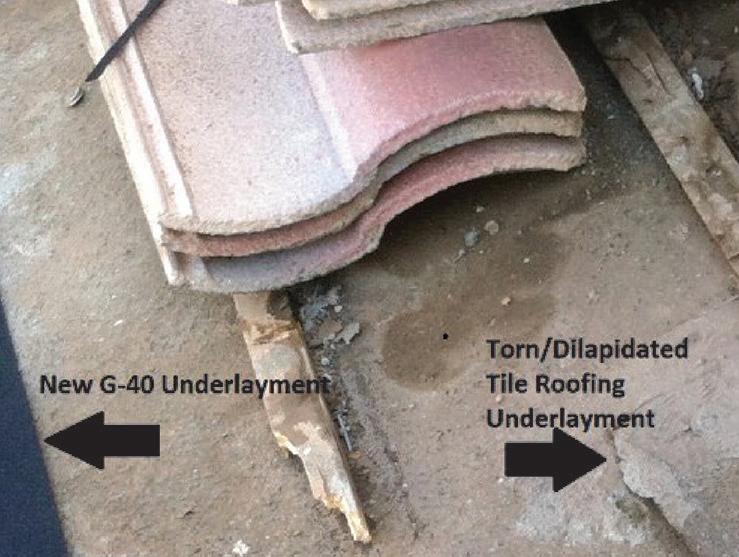
freeways asking for handouts. Interesting group of folks we have in Ahwatukee!
To which another replied: “Not everyone has the means or opportunity to own a nice house, car, etc. My only concerns would be 1. If it’s messy 2. If there is crime associated with it. It appears to be neat, and there have been no crime reports so far.”
Initially, Blandford deferred responsibility for policing the property to the Land Department, though a spokesman said state officials reminded Blandford that while it has not paid the auction price for the land yet, it did have a certificate indicating that it owns the site by nature of its winning bid on the property.
Anderson did not indicate whether anyone from the company had to chase the champers off, telling the AFN only, “They’re gone now.”
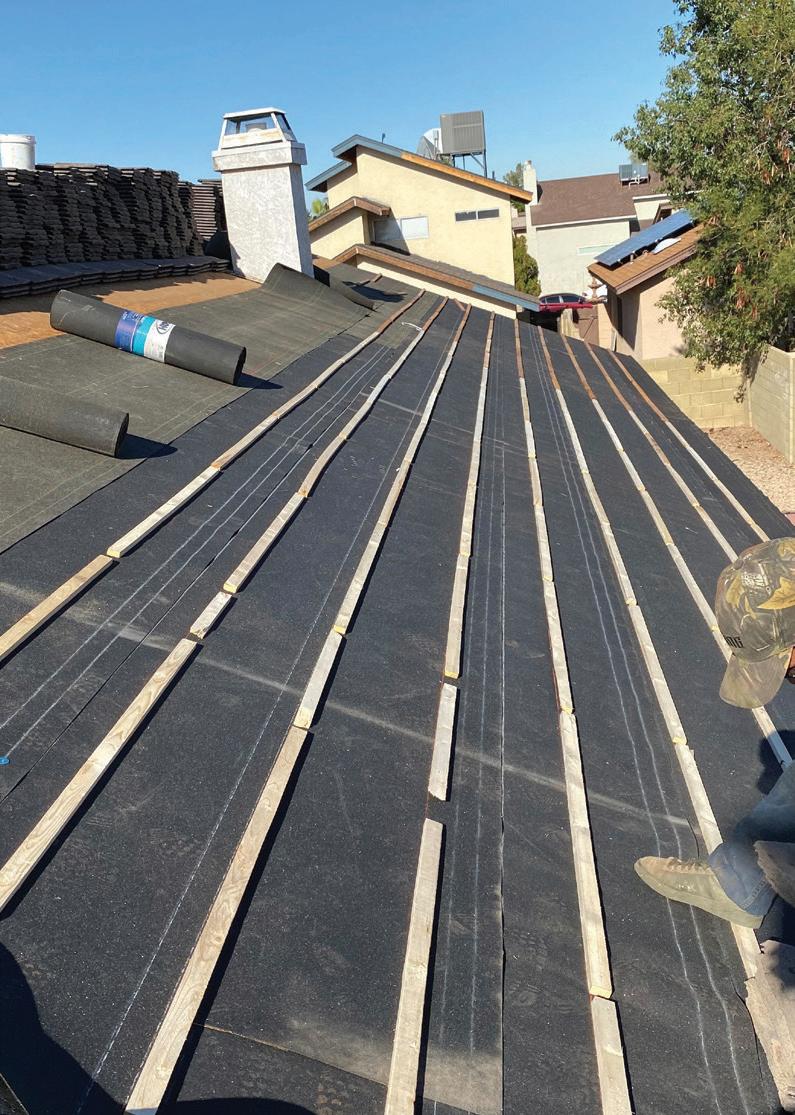


When Joshua Byrd lost three beloved grandparents due to lifestyle choices, he made a firm decision to alter the generational pattern.
“I dove deep into health and wellness,” said Byrd. “I spent many thousands of hours listening to podcasts, studying and reading books and articles by scientists, doctors, and fitness experts. I started to really pay attention to my health.”
That immersion, along with working to become a certified nutritionist, resulted in his opening of Wholeistic Fitness at 4405 E. Ray Road last October.
The culmination of a vision to offer a personalized and “wholistic” fitness space has already garnered loyal clients, ages 19 to 70.
Byrd, whose business motto is “Yesterday, You Said Tomorrow” was drawn from
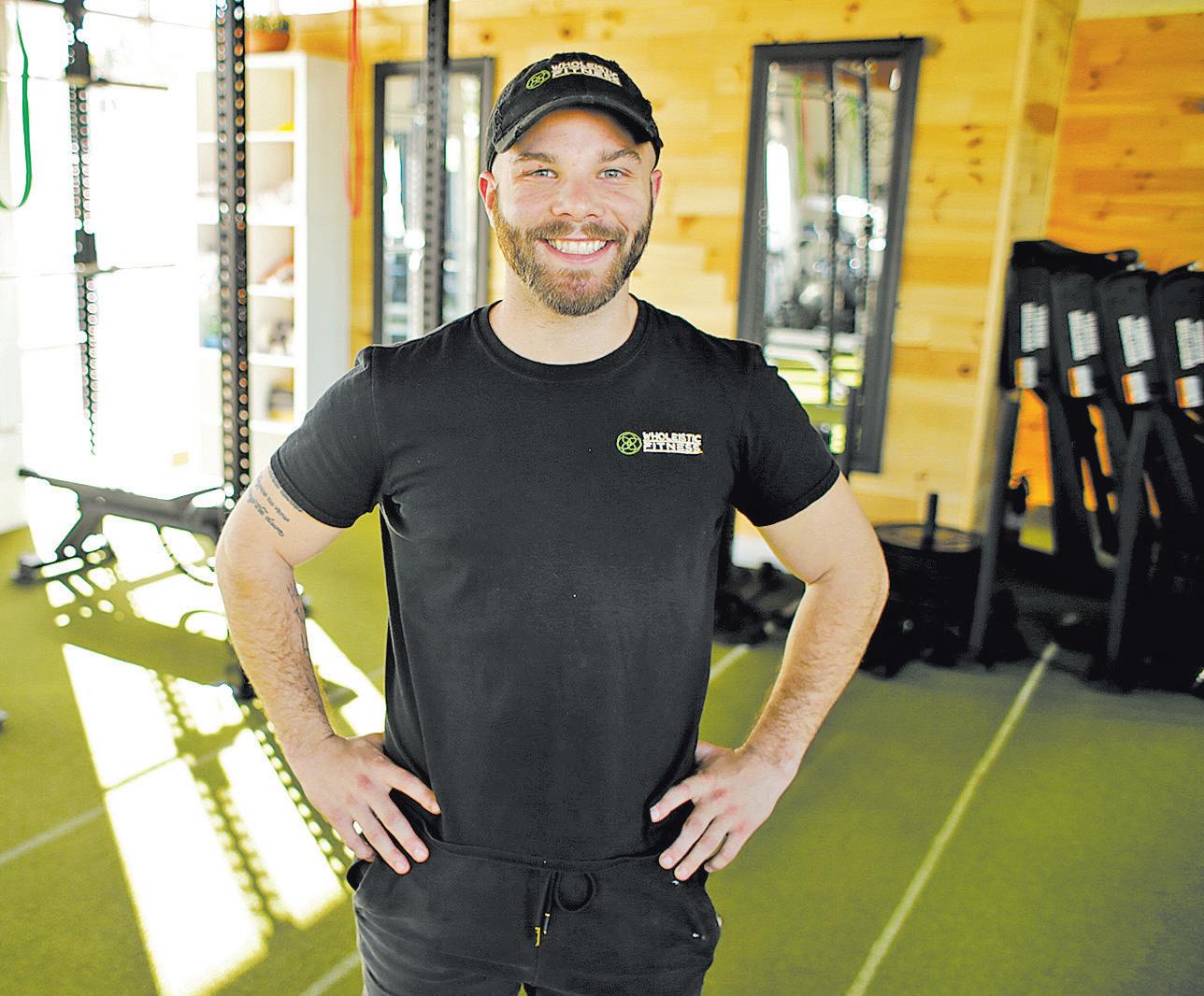
a motivational video by Shia LaBeouf, is straightforward about his grandparents, and how their demise inspired him to mindfully pursue a different path.
“My dad’s father got a cold about 20 years prior to his death; he didn’t stop to care for himself properly and it lodged in his spine, paralyzing him from the waist down,” he said.
ing a degree in biochemistry in college, where she served in ROTC.
Ahwatukee American Legion Post 64 is now the charter organization for Boy Scout Troop 172 in Tempe.
And as a representative for the charter organization, Brenda Smull in some ways is returning to her roots of a lifetime of public service.
Though she admits “I knew nothing about” Boy Scout leadership, Smull was “a proud Brownie and Girl Scout.”
While she also demurs that was “over 45 years ago,” Smull, an author and Toastmasters International leader, also served her country as a platoon leader in Operation Desert Storm after earn-
How she became a Boy Scout Charter Organization representative “was sheer serendipity,” Smull said.
She was at her office working when coworker Jason Mork poked his head in and asked, ‘Are you in the American Legion?’” she recalled.
He went on to explain that while searching online for local American Legion Posts, he discover her photographer-husband Steve Smull’s photos of veterans. Then he told her that his Boy Scout troop was looking to partner with a veterans group that would
see SCOUT page 27
Joshua Byrd adopted a different lifestyle after three grandparents died and he hopes to pass what he learned to others at his Ahwatukee gym. (David Minton/AFN Staff Photographer)
located from Texas five years ago.
“My mom’s mom died of bone cancer and her father from Parkinson’s. Their lifestyles were sedentary and their diets were filled with sugar, unhealthy carbs, and uncontrolled portions that I believe led to their ultimate ends.”
“All of these were preventable if they’d just simply eaten healthy, engaged in cardio, and practiced resistance training,” explained Byrd, who has incorporated nutrition assistance into his personalized training classes as he shepherds each client toward “sustainable transformation.”
“After that he fell into a depression in which he became heavily overweight. Over time, it was a downhill slope that included a pacemaker, infections, and eventually death due to his poor nutrition choices and complete lack of physical exercise.”
Relating the stories of his grandparents remains difficult for Byrd, who re-
He determined his was not to be “just another gym” but, as its name posits, would focus on the holistic, or the treatment of the whole person.
Besides daily drop-in classes like Group Sessions that offer full-body workouts on state-of-the-art fitness machines, free weights and other exercise
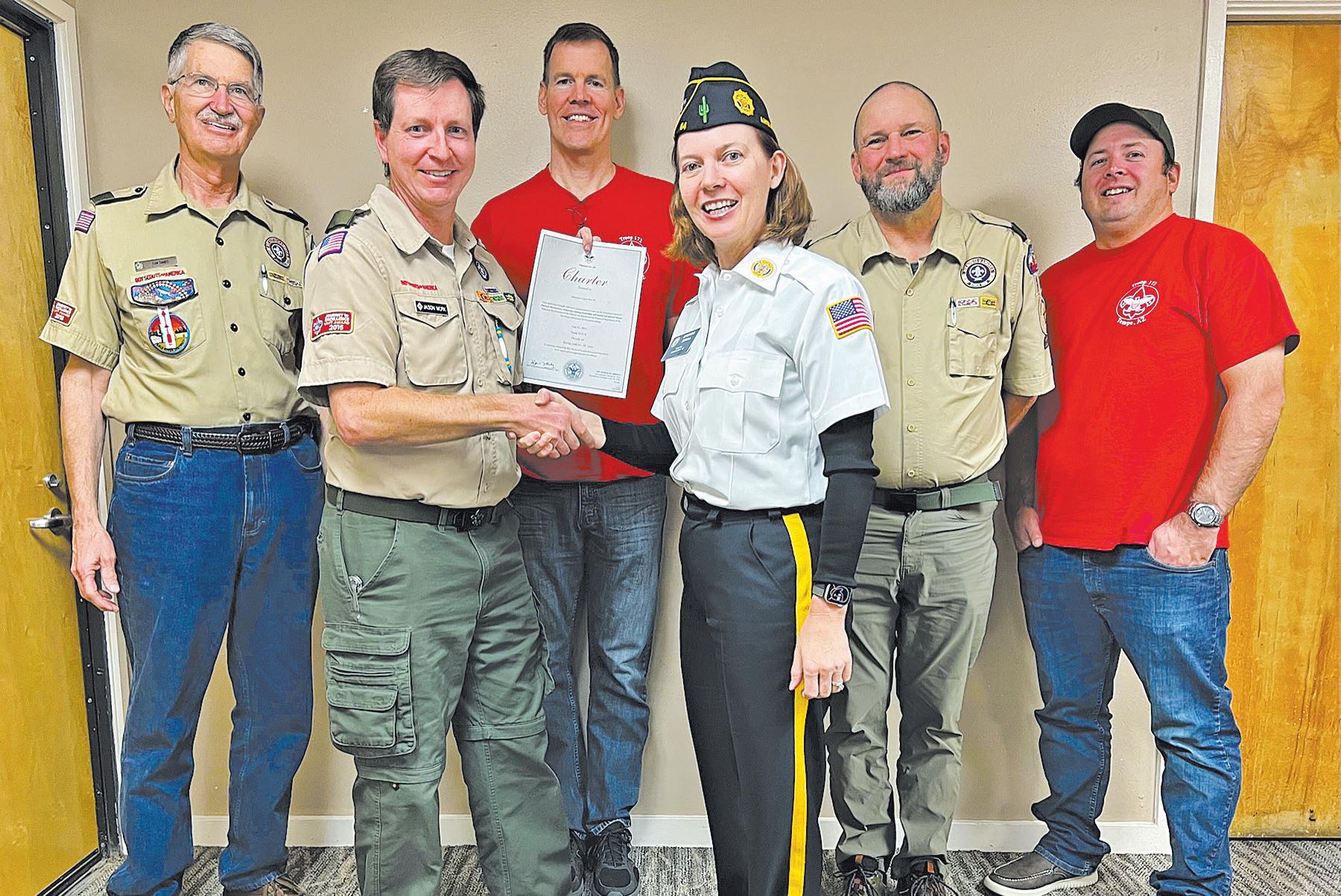

Ahwatukee youngsters Becky Pratt, 11, and Tinsley Kearney, 12, are hoping people will come out to 11614 S. Chinook Court 6:30 a.m.- 2 p.m. Friday and Saturday, Jan. 27 and 28, for a rummage sale benefitting the nonprofit Phoenix Dance Cooperative in Ahwatukee. Up until then, the cooperative is happy to pick up items left in the front of donors’ homes. After the sale, remaining items will be donated to local charities, such as the Kyrene Resource Center and Armer Foundation for Kids. The dance cooperative can provide a letter to donors for tax purposes. To arrange pickup, call Margaret at 480-9801275. (David Minton/AFN Staff Photographer)
SCOUT from page 26
sponsor it as a charter organization.
“Jason and I started the dialogue on how our teams could work together to support each other’s missions, values and goals,” said Smull, adding as she worker with the troop to establish an organizational relationship,” she said. “I received a great deal of support from leaders at the Arizona Department of the American Legion as well as the Grand Canyon Council BSA.”
“As I started digging in and reading more about the history of the American Legion and its support of Boy Scouts, I was thrilled to see the alliance goes back to the Legion’s first national convention in 1919,” Smull added.
Today, Legion posts sponsor more than 2,500 Scouting units across the country and 35 troops in Arizona have charter organization representatives in American Legion posts.
The Legion works closely with Boy Scouts for its Boys State and Boys Nation programs, which promote citizenship and leadership, and honors the Eagle Scout of the Year during its na-
tional convention with $10,000 scholarship while three runners-up each get $2,500.
“The biggest aha moment for me,” Smull said, “was the realization of just how many values and goals are common between the American Legion and the Boy Scouts America. It struck me that the 4 Pillars of the Legion align to the aims of the BSA.”
She noted that the Legion’s pillars of National Defense, Youth, Americanism, Veteran Affairs “are strongly and clearly in line with the vision and aims of the Boy Scouts” and believes, “Both of our organizations can benefit from each other in symbiotic ways for the benefit of our country, our communities, our youth and our veterans.”
Smull said Post 64’s Color Guard team “is also looking forward to working with the scouts on flag ceremonies and events.”
“There are so many things that excite and motivate me about this new charter and endeavor and I encourage you to learn more about these outstanding programs by going to legion. org/scouting/about and scouting.org,” Smull added.

equipment options, Byrd’s Wholeistic Fitness also offers daily scheduled recovery sessions that can be booked online at his website WholeisticFitness.US.
For $20, drop-ins have access to the cedar-lined Finnish dry sauna set anywhere from 185 to 203 degrees, a red light booth with red light-emitting diodes (LEDs) for red light therapy and a 39-degree Cold Plunge bath.
“Our recovery center is a place of physical and mental recovery, not only from the workouts, but from the stresses of daily life,” explained Byrd. “Recovery is a vital part of a holistic approach to health and wellness.”
“We have no workouts on Sunday, but the recovery center is open all seven days,” explained Byrd. “And clients can sign up for a special $60 a month for eight sessions, or $100 a month for 16 sessions.”
Another deviation from the typical gym is Byrd’s Wednesday night Tribe of Phoenix gathering that is free and open to any interested persons.
Beginning at 6:45 p.m. and continuing through 9:13 p.m., the Tribe of
Phoenix is the outgrowth from a weekly gathering Byrd hosted in his backyard for three years.
He said it was this gathering that helped inspire Wholeistic Fitness, 4405 E. Ray Road.
“Tribe utilizes the power of community, and modalities such as yoga, meditation, breathwork, ice bath, music, dance and more,” said Byrd. “We gather each week as friends in an opportunity to disconnect from our busy lives, connect with others, and invigorate ourselves for the rest of the week.”
Two long-time Ahwatukee residents are among those who have discovered Wholeistic Fitness to be just what they needed.
“I’ve tried a few gyms over the years but I was looking for a complete package without having to hire a nutritionist,” said Les Glenn, a 25-year resident.
“Josh gives you food help which is key to losing weight, “ Glenn continued. “Tools he gave me were the challenge food list, grocery helper list, 90-minute meal prep, recipes you can make, and dining out guides.”
Byrd explained the various food lists, like the workouts, are individually cus-

tomized based on the person’s goals and needs.
“No crazy diets, only sustainable lifestyle choices,” said Byrd. who in his early immersion into health experimented with various diets such as keto, vegetarian, pescatarian and carnivore.
Glenn said the three-times-a-week, 45-minute Wholeistic Fitness work-outs “are not dragged out.”
“I get bored if they take too long,” he said. “You do some sleds, stretch, then hit the workout. If you’re experiencing any pain or difficulty, Josh will change the exercise to hit the muscle in a different way to help strengthen it.
“Plus, the accountability app he has you use keeps track of everything including taking pictures of your food, entering your stats – weight, drink water, go to bed at the same time, workout, etc., prove to him you’re doing the work.”
“The results say it all. I lost 12 pounds and inches in less than six weeks.”
Lisa Fuller, who’s lived in Ahwatukee nearly three decades, refers to Joshua Byrd as “the real deal” and Wholeistic Fitness as “a gem of a gym.”
“Holistic is Joshua’s key as he practices the training, the diet plan, and
the accountability with his rejuvenating positive attitude. He’s like no other I’ve ever had the experience of working with,” she said.
“This is not like any gym or workout I’ve ever experienced, and he has the tools to back up every commitment he makes to you.”
His enthusiasm and commitment, she said, are unparalleled.
“As soon as you open his door, you’re greeted with a welcome, and he’s so happy with unbounding energy that no matter what was on your mind before, it’s immediately erased as Josh has you focused on yourself and your workout,” Fuller continued.
“It makes for an unbelievable difference in my attitude and preparation for a busy life, she added. “You may try to hit your aches with a heating pad or ice at home, but the key is the recovery center; it’s a full, holistic approach, hitting all areas. All amazing, and a useful quiet time to regroup or check out from your mind.”
For a limited time, Wholeistic Fitness is offering a free 30-minute consultation that can be booked through WholeisticFitness.US.



Now that the Christmas decorations have been put away, it’s time for schools, groups, businesses and even families to start thinking about their entries in the 47th annual Kiwanis Ahwatukee Easter Parade and Spring Fling April 8.
The club is already planning the parade, which starts at Warner Road and 48th Street and heads north to Elliot Road.
Though entries are being accepted until March 30, it’s never too early for organizations “to put their heads together and organize their entries,” said Mike Schmitt, Parade Boss for the 31st consecutive year.
Spectators are welcome to bring lawn chairs or spread blankets and enjoy the parade. Public address stations will be located at Ahwatukee Country Club and at the corners of Ahwatukee Drive, Kiowa Street and Pawnee Street.
Kiwanis Club President Carrie Chipman also reminds people that the club will need volunteers for the Spring Fling fundraiser that immediately follows the parade, which starts at 10 a.m.
After the parade, the Spring Fling at Ahwatukee Community Center Park, 48th Street and Warner Road, will offer entertainment by local groups, vendor and craft booths, Easter Egg hunt, carnival rides, games, food, beverages, and games until 4 p.m.
Parade entry forms have been mailed to over 300 local businesses, groups and previous parade entries. But those who haven’t received one can call 480-759-0007 or e-mail msch0007@aol.com.
For more Spring Fling information call 602-402-6267 or email andi@wttaz.com .Forms are available at ahwatukeekiwanis.org.
The popular Transportation Day sponsored by God’s Garden Preschool and Kindergarten will be held 10 a.m.-2 p.m. Feb. 11 on its grounds, 1401 E. Liberty Lane, Ahwatukee.
The free event gives kids a chance to inspect dozens of utility and other vehicles, such as fire trucks, police cars, and other vehicles. The free event also will have bouncy houses, pony rides, train rides and other activities.
Businesses also have sponsorship opportunities and can find more information at transportationday.com.
Students at Kyrene de la Estrella will soon be exploring Science, Technology, Engineering, Arts and Math (STEAM) after Assistant Principal Sladjana DeAngelo received a $2,500 Equity in STEAM 2.0 grant from YWCA Metropolitan Phoenix, Intel and the Salt River Project.
DeAngelo said, “Receiving this grant will allow our students to experience some hands-on STEAM activities and inspire them to think outside of the box.”
The grant will be used to purchase materials for two Makerspace on Wheels carts.
Each cart will be equipped with moldable raw materials like clay, cardboard, masking tape, construction paper, wooden dowels and craft sticks. Snap Circuit Boards will also be included in the carts to allow students to safely learn the basics of electrical engineering.
“Our goal is to inspire our students to be problem solvers, analytical thinkers, collaborators and overall future change makers, which also is aligned with the Portrait of a Kyrene Kid,” said DeAngelo.
“We have a very diverse campus at Estrella and our students need to be exposed to STEAM opportunities during their school day to see their future potential within STEAM careers.”
Eventually, the goal is for the program to expand so that all classrooms have opportunities to engage in long-term, complex STEAM activities.
Cactus Jacks Bar & Grill, 48th Street and Elliot Road, in Ahwatukee is hosting its annual Valentines Dance Party starting at 6:30 p.m. Feb. 8 with line dancing lessons and open dancing.
Treats and raffles are in store and the admission is $5.
Information: Carrie at cmcneish@cox.net or dancemeetsfitness.net.
The Kiwanis Club of Ahwatukee has announced a full roster of speakers for its weekly meetings at 7:30 a.m. Thursdays, which will be held for the time being at the Ahwatukee Event Center, 4700 E. Warner Road until repairs are completed at its usual meeting site, Biscuits Restaurant in the Safeway Plaza on the southwest corner of Elliot Road and 48th Street.
Speakers include: Jan 26, a representative of Helping Hearts; Feb. 9, Jeff Parent, Ahwatukee Little League; Feb. 6, Kevin Robinson, Phoenix City Council candidate; March 9, Mary Adams, of Mountain View Lutheran Church; and March 16, Juan Te Dailey, of D Squared Homes for the Homeless.
Ironwood Library, 4333 E Chandler Blvd., Ahwatukee, presents a variety of programs for children, teens and adults. Unless otherwise noted, free tickets are required and available 30 minutes before programs’ start times at the library’s information desk.
For more information: phoenixpubliclibrary.org.
Babytimes
Babies ages birth to 23 months, accompanied by a favorite adult, will enjoy songs, rhymes, books, and interactive fun Tuesdays, 10:30-11:10 a.m. Space is limited to 12 families.
Toddlertimes
Toddlers ages 24-36 months, accompanied by a favorite adult, will enjoy songs, rhymes, books, and interactive fun
see AROUND page 30







We are here to make this difficult time easier for you. Our 24 hour online service is easy to use and will walk you through the steps of placing a paid obituary in the West Valley View or a free death notice.
Visit: obituaries.Ahwatukee.com

Vocal Connection, a women’s a cappella chorus, takes pride in what it does.
“It’s a proven fact that singing in a chorus is more fun when surrounded by friends, singing their hearts out,” it said in a released. “According to recent research, humans are wired for rhythmic togetherness, and bond best when making music with each other. Why?
“Studies show that singing in a chorus improves our mood, with a decrease in stress, depression and anxiety. These effects are linked to the use of deeper breathing techniques associated with singing. The benefits are enhanced in a group setting because singing in a group offers a sense of belonging to something larger than ourselves.
“Beyond the psychological effects, our physical health is impacted also: lower blood pressure, increased blood oxygen saturation, elevated immunity, higher pain threshold, and stronger respiratory muscles.”
The group also believes “making music together provides a sense of awe not just for the observers of a performance, but for the participants, as well. Research shows that this emotion seems to shift our focus from our own selfview to that of our community.
Thursdays, 10:30-11:10 a.m. Space is limited to 12 families. Sit, Stay, Read!
Young readers & listeners can sign up for reading time with a registered therapy dog/handler team. Read with Elsa 4-5 p.m. every uesday.
Family storytime at Pecos Park
Children birth to age five and their favorite grownups play, read, sing, and dance in a fun, active program that builds reading skills. Every Friday, 9:30-10 a.m., outdoors at Pecos Park, 17010 S. 48th St. No tickets required. Supported by a grant from First Things First.
Sit, Stay, Read!
Young readers & listeners can sign up for reading time with a registered therapy dog/handler team. Read with Elsa every Tuesday, 4-5 p.m. Read with Raven every Thursday, 4-5 p.m.
Full STEAM Ahead
Children ages 6-12 explore hands-on creative ways to design, experiment, and invent Saturdays, 2-3 p.m., in this Science, Technology, Engineering, Art and Math (STEAM) program. No Full STEAM Ahead on Feb. 25. No tickets required.
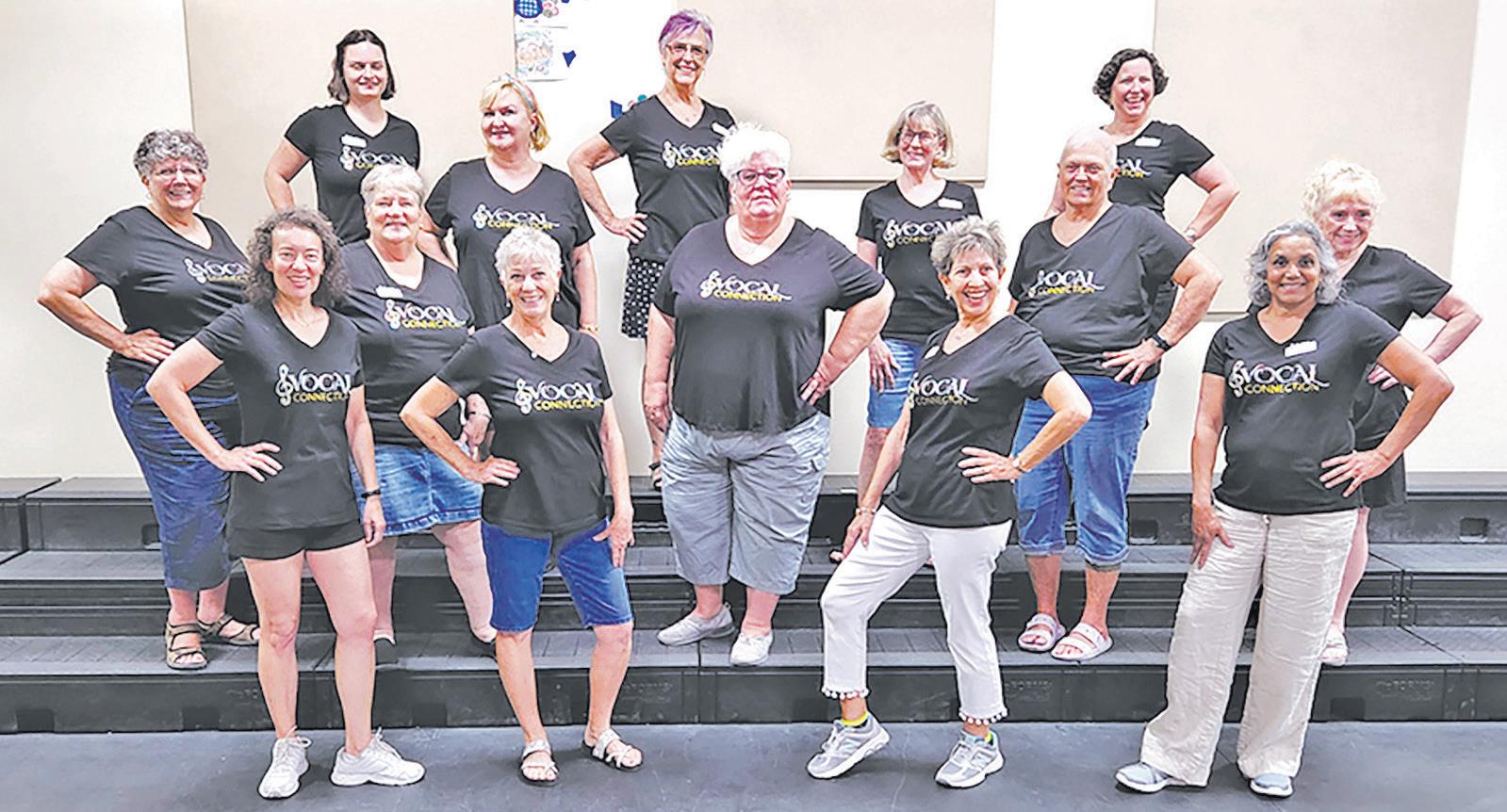
Toward that end, Vocal Connection is inviting area women looking to decrease stress, improve their health and make connections with other like-minded women in the community while singing to a guest night 6:30-9:30 p.m. Jan. 30 at Seton Catholic Preparatory, 1150 N. Dobson Road, Chandler.
Attendees must be able to sing but do not need to be able to read music to join. Vocal training and music education are components of Vocal Connection’s many benefits.
To accommodate those attending the Guest Night, we ask that you pre-register by emailing us at guestinfo@vocalcon-
Families, hop on your bikes and pedal to the library to learn safe cycling tips from John Boyd, Injury Prevention Specialist at Phoenix Children’s. Then practice your safety skills on our bicycle course. No bike? No problem! We will have bicycles for kids ages 11 & younger to borrow. We’ll also have a bike helmet give-away, while supplies last. Feb. 25, 9-11 a.m. No tickets required.
Join Ironwood’s Library Teen Council!
We’re looking for teens ages 12-17 who would like to help us organize programs, create displays, and improve the library experience for all library users! Participating in our library teen council is a great opportunity for those wanting experience in a work environment for school, scholarship, or job applications.
Online volunteer applications are available at volunteer.phoenix.gov. Under “Browse by Interest” choose “Library,” in the “Keyword” box type “Ironwood,” and complete the appropriate application. A volunteer coordinator will notify applicants when the first meeting will take place. Monthly meeting are on Fridays, 3:304:30 p.m Feb. 3 & March 3.
Adults and teens can learn a new papercraft the first
nection.org. Additional details will be provided but attendees must pre-register.
Vocal Connection Chorus is one of hundreds of Sweet Adeline International choruses that make up a worldwide organization of women who sing four-part a cappella and barbershop harmony.
Vocal Connection Chorus performs regularly throughout the community, offering its talent for entertainment at civic events and charitable functions, in addition to promoting harmony and friendship among women.
Information/registration: GuestInfo@vocalconnection.org or vocalconnection.org.
Wednesday of each month. The group will be starting with flowers and all materials will be provided. Feb. 1 and March 1, 4:30-5:30 p.m. No tickets required.
Sit and Stitch
Join fellow stitchers on the first Saturday of each month, Feb 4, 3-4:45 p.m. Knitting, crocheting, crossstitch, needlepoint…all are welcome! No tickets required.
Next Chapter Book Club
This inclusive community-based book club is designed for people ages 12+ with intellectual and developmental disabilities who have a desire to make friends, explore their community, and read (regardless of current reading ability). This weekly gathering is free and occurs every Wednesday, 3:30-4:30 p.m. Registration is required and available in the library or online in the Calendar section of the library’s website.
Adult readers 18+ can meet up with fellow adventuresome bibliophiles to share their thoughts about each month’s selection the first Wednesday of each month, 5:00-5:45 p.m. No tickets required. On Feb. 1 the group will discuss A Woman of No Importance by Sonia Purnell, and on March 1, The Paris Library by Janet Skeslien Charles.








































They





Although skyrocketing egg prices have been hard to swallow for all consumers, some small businesses have been especially hard hit lately.
The cost of eggs was up 60 percent in December from a year earlier, according to the Consumer Price Index, in large part due to a fast-spreading avian flu that resulted in the loss of more than 43 million egg-laying hens. An entire flock must be killed if even one bird tests positive.
The price hikes might mean a few dollars more each month for many shoppers, but restaurants that serve breakfast and lunch – as well as bakeries that depend on eggs for numerous recipes - are suffering even more.
Laura Reyes-Call, who took over ownership of The Nosh Cafe in Ahwatukee Foothills in October 2022, said she uses 12 cases of eggs a week.

She had a receipt showing she paid nearly $90 for one case, which contains 15 dozen eggs. The price spiked about
$30 in three months, she noted. Although eggs and many other costs, including labor, were starting to climb
before she bought The Nosh, Reyes-Call hasn’t raised prices.
“As new owners, we didn’t want to give that impact to the loyal customers,” she said.
However, because a majority of menu items at The Nosh use eggs — including breakfast bagels, breakfast burritos, omelets, scrambles and breakfast plates — Reyes-Call said price increases are inevitable.
“We’re not making money,” she stated. “I’m the owner. I work here every single day.” Reyes-Call hasn’t determined exactly how much the increases will be at The Nosh.
Over at Wicked Brews, Bites & Spirits, owner Chip Mahoney said he’s raised prices 50 cents or $1 on some items like the chicken and waffles and breakfast sandwich.
“Inflation has hit us in many different
The Ahwatukee Foothills Chamber of Commerce has announced the finalists for its Impact Awards.
People will have a chance to learn who the winners are in real-time at an awards gala the Chamber will hold 5:30-7:30 p.m. Feb. 2 at the Foothills Golf Club, 2201 E Clubhouse Drive, Ahwatukee.
The event will include a keynote address by Caitlin Penny, founder of Copper Theory Creative, who will discuss “Vision, Innovation and Lessons Learned for Small Business Owners.”
The red carpet event also will “celebrate the old timers and newcomers whose knowledge, energy and optimism will launch the Village of Ahwatukee into higher heights,” the Chamber said in a release. “It’s also a reminder that tomorrow, our business community can reach
greater heights.
“In more than two decades of fighting for shop local and build community, the Chamber has learned that Ahwatukee is a great place to work, shop, play and live.”
Here are the semi-finalists:
Micro Business: Nonnahs Marketing, Nothing Bundt Cakes, The Buzzed Goat.
Small Business: Waxing The City, Where U Bean Coffee, Von Hanson’s Meat and Spirits.
Medium Business: Music Maker Workshops, Vision Community Management, Zesty Zzeeks Pizza and Wings.
Large Business: Arizona’s Vision, Iconic Tire and Service Center, Native Grill and Wings.
Corporate Business: YMCA Valley of the Sun, Costco, Wells Fargo.
Family-Owned Business: Brewer’s Air Conditioning, and Heating, Dr. Janet Euzarraga (Dr, E); Wicked Brews Bites
and Spirits.
Start-Up Business: Kolache Café, Nothing Bundt Cakes, Pops Rockin’ Kettle Corn.
Mentor of the Year: Matt Olschner (Coach Matt), Moses Sanchez ( Nonnahs Marketing), Rick Allen (30 Fold).
Rising Star in Ahwatukee: Alyson Cramer (Awaken Chiropractic), Jose Leal (Kolache Café), Krista Didion (CK’s Tavern).
Champion of Change: Alexis Breyer (Breyer Law), Kema Charles (Lights Camera Discover), Linda Highland (Wells Fargo).
Community Leader Ahwatukee: Darin Fisher (Vision Management), Dee & Lisa Grayer (UFC Gym Ahwatukee), Rick Savagian (Mountainside Martial Arts), Traci Tartaglio (Ahwatukee Carpets), Gabe Von Weimer (The Buzzed Goat).
Educator & Administrator of the Year Ahwatukee: Ann Leftwich (Kyrene
School District), Cindy Weir (Music Maker Workshops), Katie Anderson (Kyrene de la Sierra), Mary Adams (Ahwatukee Preschool), Meaghan McClung (Ahwatukee Foothills Montessori).
Woman Business Owner of the Year: Ayesha Siddiqi (WhereUBean Coffee), Erin Owens (Fuchsia), Rachael Richards (R House Group), Shannon Gilpin (Nonnahs Marketing).
‘Shero’ of the Year: Enery Lopez (AmTrust Bank), Mary Ellen Tornesello (Chick Fil A), Sandra Franks (YMCA Ahwatukee). Female Realtor of the Year: Bonny Holland, Cynthia Worley, Jill Bittner, Mary Jo Santistevan
Male Realtor of the Year: Geno Ross, Jeff Cayton, Kevin Houston, Paul Aslaber. Non-Profit of the Year: Armer Foundation, Boys to Men Phoenix, Treasurers 4 Teachers, Arizona Neighborhood Transformation.
areas, from oil prices to bacon,” Mahoney said. “So we’ve had to make a price increase for many reasons, and eggs was one of the factors.”
Wicked Brews, Bites & Spirits goes through about three cases of eggs a week, he said, mostly on weekends when the eatery serves brunch from 9 a.m. to 1 p.m.
But it also uses eggs in pizza, on burgers and in other recipes – and it adds up.
“We were paying right around $45 per case, and now we’re paying between $90 and $110,” Mahoney said.
He added there’s more loss in the kitchen with eggs, too: “They’re easily broken,” he said. “It becomes tough.”
Also, Mahoney noted, restaurants have a thin profit margin as is.
“A good restaurant will have 10 to 15 percent profit,” he said. “With all the inflation, some [places] have gone down to between 5 and 10 percent.”
Bakeries and home-based bakers are also feeling the pinch.
Jill Bush, the “Coronado Cookie Lady,” who has a loyal following in Ahwatukee and uses Zesty Zzeek’s Pizza on Warner Road and 48th Street as a pickup spot,
said she uses five dozen eggs a week.
“I do not like raising my prices, but with the way things have been the past two years, it’s been really, really rough,” Bush said. “I still want to be fair to my customers.”
Her cookies are $15 a dozen, and she also sells brownies, muffins, coffee cakes and keto-friendly sweets.
“I have people telling me all the time, ‘You need to raise your prices,’ and I probably should,” Bush said. However, “From a customer standpoint, it’s hard to justify spending that much money” on baked goods, she noted.
With egg prices reaching historic highs, it’s no surprise that egg suppliers’ profits have soared — one major supplier, Cal-Maine Foods, saw profits increase 65 percent to $198 million by the end of November 2022, according to news reports.
But Mahoney at Wicked Brews, Bites & Spirits said it’s not just eggs creating havoc: Costs of everything from cooking oil to Quickbooks are on the rise.
He admitted menu items might go up again, but there’s a balance.
“I can’t raise my prices to where I’m not competitive or it’s so much that people don’t go out anymore,” he explained.

Arizona still has far more job openings than people employers are able to hire.
New figures Thursday from the state Office of Economic Opportunity show the seasonally adjusted unemployment rate for December dropped by a tenth of a point, to 4.0%.
But a crucial indicator is that there is still what Doug Walls, the agency’s labor market information director, calls a “significant gap’’ between the rate that companies are bringing people on board and the number of positions they need to fill. Those rates pretty much tracked each other until the pandemic.
Walls said that demand for workers that exceeds those looking for jobs also is forcing employers here to “be more competitive in order to attract that talent.’’
The average hourly wage in Arizona is up 5.7% from the same time last year, to

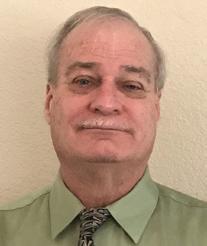

$30.81, versus 4.6% nationally.
“Employers are trying to incentivize potential employees to come work for them by increasing wages,’’ he said.
Still that average remains below the national figure of $32.73.
Walls said employers are being aided by the fact that the number of people i looking for work continues to increase. And that in turn is fed by people moving to Arizona, with the state’s labor force having now increased for 30 consecutive months.
At the same time, though, there are potential headwinds to that trend, led by the fact that the cost of living in Arizona, as measured by the consumer price index in Phoenix, is higher than the national average. It is up by 9.5% in the past year, compared with 6.5% for the rest of the country.
And leading that is the cost of housing which is 15.4% above the same time a year ago, versus 8.1% nationally. see JOBS page 35
















But there may be some relief on the way on the expense side of the equation, especially those housing costs.
The median listing price of a home in Arizona had topped $520,000 early last year. Since then there has been a steady decrease, dropping to $462,500 in November and by another more than $9,000 last month.
Demand also has dropped. As recently as last summer, the typical home in Arizona was on the market for just 24 days before being snapped up. That hit 59 days in November -- and 71 days in December, a figure not seen since 2017.
But builders also are taking notice.
In November, the most recent month available, they took out just 3,492 permits for new housing units. That’s a 16.1% drop from the prior month and down by 45.3% from the same time a year earlier.
All that is reflected in the new employment numbers, with the construction industry shrinking by 2,600 jobs between November and December. And another 700 jobs were lost in the sector of the economy that writes mortgages and other loans.
For the moment, Walls is not worried that the available workforce will dry up.
“At this point, we haven’t seen any indication that the population is being deterred from coming to Arizona because of those higher housing prices,’’ he said. And Walls said he is paying attention to some of those other indicators, like higher housing inventory and time homes are on the market.
“Those are all trending in the direction to help potential buyers purchase those homes,’’ he said. “That allows potential buyers be pickier or gives them some stake in the negotiations that they might not have had in the last several years.’’
Overall, the state added 11,200 jobs in the private sector between November and December, an increase of 0.4%.
Manufacturing shed 300 jobs in the past month. But employment growth remains strong at 8.1% on a year-over-year basis, including an 11.6% increase over that same time in hiring by companies that make aerospace products and parts.
And the new figures also show strong growth in the segment of the economy that includes arts, entertainment and recreation, with Walls specifically pointing out gains in employment at golf courses.

Hooray! The annual Ahwatukee Chamber “Best of Business” voting is completed. The Ahwatukee Foothills Chamber will proudly present the “Best of Business” winners, at the Impact Awards Gala sponsored by the Ahwatukee Chamber and Ahwatukee Chamber Women in Business on February 2nd at The Foothills Golf Club, 2201 E Clubhouse Dr, Ahwatukee, AZ 85048. Caitlin Penny, founder of Copper Theory Creative will be giving the keynote address, “Vision, innovation and lessons learned for small business owners.” Winners and nominees will be featured at the Red Carpet event in the Ahwatukee Foothills. If you have not been contacted about your category please reach out to the Ahwatukee Chamber at info@ahwatukeechamber.com for more details. Best of Business Ahwatukee is the space where we pause to celebrate the old timers and newcomers whose knowledge, energy and optimism will launch the Village of Ahwatukee into higher heights. It’s also a reminder that tomorrow, our business community can reach greater heights. In more than two decades of fighting for shop local and build community, the Chamber has learned that Ahwatukee is a GREAT place to work, shop, play and live.
Join us on February 2nd from 5:30 pm to 7:30 pm in celebration of the men and women business leaders who make Ahwatukee what it is. Walk the red Carpet, recognize the great businesses, have a great meal and toast friends, and leave knowing that Ahwatukee will grow and flourish under leadership of our great business community. Here are the nominees. Winners will be announced live on stage at Foothills Golf Club. See you at Gala!!




To our readers
The Ahwatukee Foothills News has invited Phoenix City Council District 6 candidates Kevin Robinson and Sam Stone to write a column every week now through March 1. Aside from two in which AFN asked them to address specific subjects, the candidates were invited to write on topics on their choice.
Early voting for the March 14 runoff election begins Feb. 15 and the last day to register to vote is Feb. 13.To register: elections.maricopa.gov/voter-registration/ register-to-vote.
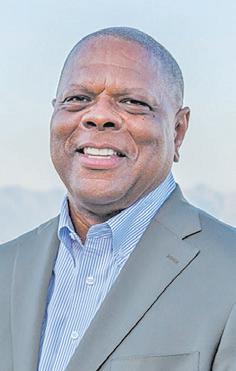 BY KEVIN ROBINSON AFN Guest Writer
BY KEVIN ROBINSON AFN Guest Writer
As I look back on the growth of Ahwatukee over the past 20 to 25 years, there has been one common denominator: small businesses. Small businesses are the lifeblood of the Ahwatukee community, providing much needed services to residents who call the area home. I once read that “a small business is an amazing way to serve and leave an impact on the world you live in.”
No truer words have ever been written or spoken, especially when we examine the impact that small businesses have had on Ahwatukee.
Recently, I met Kema Charles, the executive director and founder of Lights Camera Discover, an Ahwatukee-based small business that uses the arts to teach teamwork to middle and high school students. Ms. Charles explained to me that her business is experiencing measurable success, crediting the Ahwatukee community. Ms. Charles is making an impact on our Ahwatukee community, providing experiences for young people that will no doubt last a lifetime.
Then there’s Michelle Slayton, a McDonalds restaurant owner-operator in Ahwatukee, she told me about her efforts to help employ young people in the area, often giving them their first job. I think we can all remember our first jobs, and the impact it had on our
lives. Ms. Slayton is making a difference in our Ahwatukee community.
Bob Anthony and Kim Jones, Ahwatukee residents and co-owners of Chef Bob Anthony Catering, a small catering business based in Ahwatukee providing catering services around the Valley. Chef Bob told me that his most loyal customers are his neighbors and friends who live in Ahwatukee. The sharing of food has bought people together since the beginning of time, Chef Bob’s culinary skills have made for many a good time bringing people together. Chef Bob and Kim Jones are making a difference in our Ahwatukee community.
Lastly, Dina Walling and her son Cole Walling are two of the newest small business owners to call Ahwatukee home. Their PetWellClinic is a welcome addition to the Ahwatukee business landscape. Dina and Cole explained to me that they chose Ahwatukee because of the closeknit community where the core value of their business, being a part of the community, could be easily accomplished. Dina and Cole will undoubtedly make a difference in our Ahwatukee community. These are just four of the more than 750 small businesses that call Ahwatukee home. Small businesses are integral to our economy, they have a storied history in Ahwatukee, it’s a community that appreciates the hard work of individuals providing needed services to the community.
 BY SAM STONE AFN Guest Writer
BY SAM STONE AFN Guest Writer
I’ve said for years that Donald Trump and Bernie Sanders are two sides of the same coin: opposite solutions to the exact same problem – government is not doing a good job of delivering the services people want, or the infrastructure we need.
And everyone can see it.
That’s why, I believe, voters are looking for answers outside the political establishment. It’s not a revenue issue – we are collecting record tax revenues at every level, from the U.S. Federal Government all the way down to the City of Phoenix.
Yet, across the country and right here at home our roads and bridges are crumbling, desperately needed infrastructure to move and store water is tied up in endless legal and bureaucratic infighting, and services like housing for the indigent and people with special needs are built at a snail’s pace while the cost of those projects rabbits ahead at light speed.
I didn’t understand why that was the case until I had a chance to see how our government is operating up close.
It’s a mess; and the reason is simple, but significant: politicians love to tell people what we need to do, and why we need to do it, then spend zero time on how we do it.
Combine that with the natural incentive system of bureaucracies where how
many people work in your department and how much money you’re spending, rather than how successful your outcomes are defines success, and you have a perfect recipe for declining services and public dissatisfaction.
I spent a lot of my time as Sal DiCiccio’s chief-of-staff focusing on the “how” – and I was the only person on the Council floor at City Hall who did.
It’s one the primary reasons I’m asking for your vote: so I can go back in there and fight to make our city more productive and efficient in the things we already do so that we can free up money for the things we’re not doing (or not doing enough of) and need to be.
This past summer I worked with Ahwatukee’s pickleball community to secure funding to convert two tennis courts at Desert Foothills Park into dual-use tennis and pickleball courts. The city agreed and work was “completed” this week.
It just wasn’t done very well.
The nets aren’t readily adjustable to accommodate both sports. The paint scheme left out some key elements for court delineation. Signage is a bit confusing. Issues with yellowed lighting covers weren’t addressed.
Now, some of these things might get fixed going forward – and I joined this week with advocates in meeting City Parks & Rec officials on site to discuss that.
But when it does, those changes will cost more than they would have if it had


Small businesses thrive in our Ahwatukee community because the residents appreciate the quality of service and goods that such businesses provide.
Once in office, I will advocate for small businesses by working closely with local chambers of commerce.
been done right the first time.
Bad planning and execution like this are too common in our City, and I’ll fight to fix things on that end. But the other element at play is the contracting processes we use – systems that are adding between 50 and 100 percent to the cost of every single thing Phoenix does or buys.





I will work towards reducing the burdens that small businesses must contend with when they interact with various departments within the City of Phoenix government structure. I will look for ways to allow small businesses to navigate the city government bureaucracy more easily, eliminate lengthy timeframes which invariably cost small business owners time and money.
I will work with organizations such as the Arizona Commerce Authority (amongst others) to explore opportunities for our area small businesses. In short, I will support our Ahwatukee small businesses. After all, they are the lifeblood of our Ahwatukee community.
The reasons it costs $7.99 for a fourpack of blue Bic pens at City Hall are the same reasons putting in a new traffic light at an intersection costs us 50% more than it does for a private developer to get the exact same work done by the exact same companies: our bid process is so complicated, lengthy, and unnecessarily time consuming that companies pad every single bid by a huge amount to cover those costs.
And then, because they know they won’t win every bid, they add the cost of processing two or three additional bids into the mix as well.
In 15 years of working in politics, I haven’t encountered a single elected official focused on fixing this problem. I will be.











Check us out and like the Ahwatukee Foothills News on Facebook
Since Ashle Ledford got into coaching shortly after her college basketball career at Mesa Community College came to an end due to a third ACL tear, she knew she wanted to one day end up back at her alma mater, Mountain Pointe.
How she would get there, however, wasn’t clear.
She began coaching at Hamilton under coach Trevor Neider as an assistant for the girls’ basketball team. She learned the ropes from Neider, who has won several state titles with the Huskies.
She was content where she was. Then the Mountain Pointe job opened in the middle of the season. She knew it was her opportunity.
“This feels like coming home, the perfect spot,” said Ashle, who is also currently studying biomedical engineering. “I couldn’t ask for anything better my first time coaching varsity and to be back at the school where I started my whole basketball career.”
Ashle came on board as an interim for the Pride near the back end of the season. Aaron Frana, Mountain Pointe’s athletic director, promoted her to head coach after conversations with players. They shared positive experiences with Ashle leading the way, as she recognized what needed to be changed within the program, including culture and creating a bond with each player.
But first, she needed an assistant coach she could trust to help not only establish those core values but also help every player develop a higher level of skills on the court.
She looked no further than her husband and high school sweetheart from Mountain Pointe, Isaiah.
“I don’t think I could’ve asked for a better assistant coach,” Ashle said. “I feel like I’m learning a lot from him because of his college basketball experience. It’s been a lot of fun.”
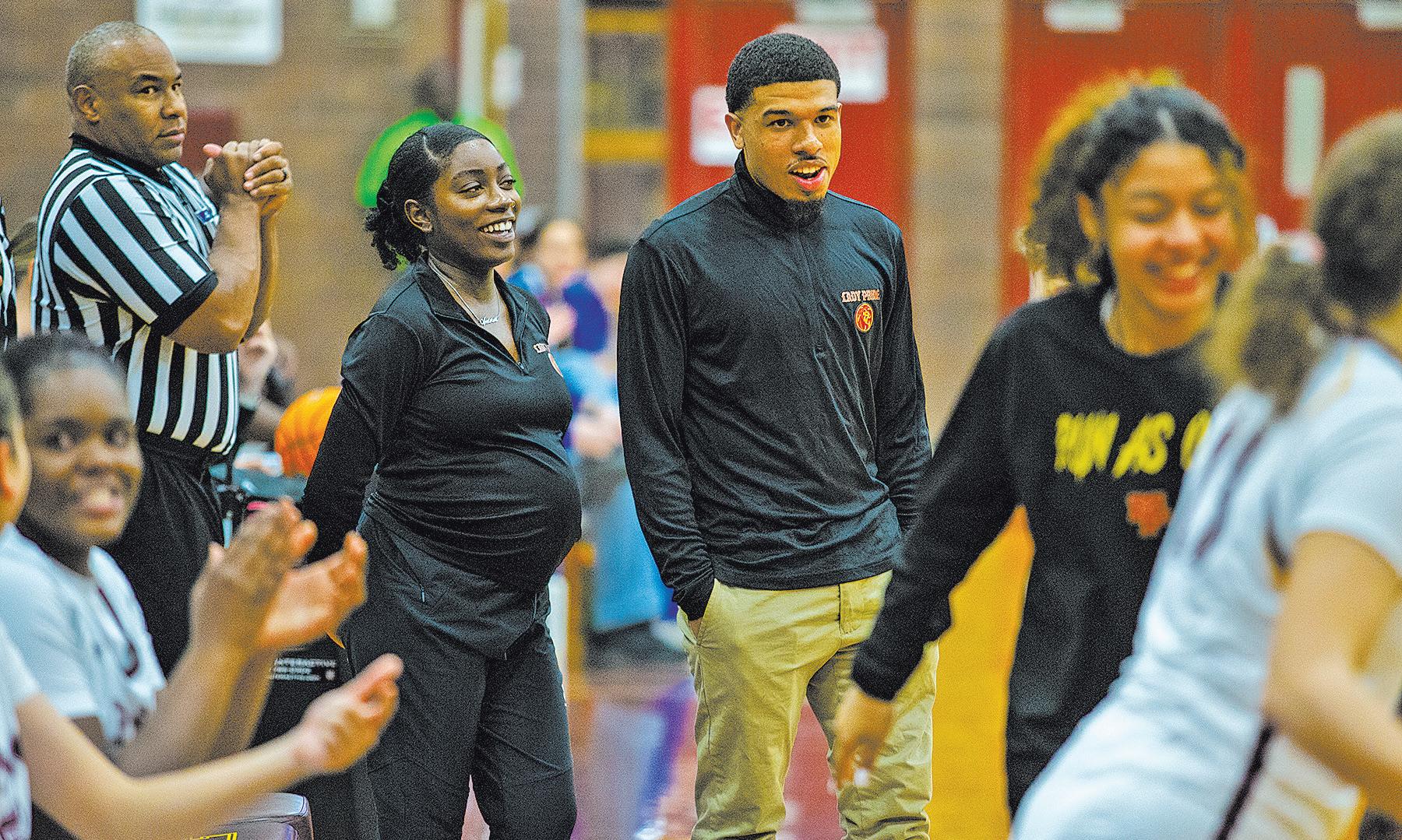
The two met as seniors at Mountain Pointe. Ashle played for the Lady Pride while Isaiah was part of the boys’ team.
Now married with their first child on the way, the two have remained in basketball. Isaiah went on to play at Chandler-Gilbert Community College before
concussions derailed his career. He was brought on as an assistant for the Coyotes where he remains today.
It isn’t easy juggling both jobs and trying to veer away from it when he and Ashle head home for the day. They find themselves talking about basketball of-

ten, but also know when to take a break from those conversations.
Though, with how the Mountain Pointe girls have improved this season, it’s hard to not speak about it at home.
“I think it takes us a second to get out of it,” Ashle said. “It definitely takes us some time. The ride home, when we get home, it takes us a couple of hours to snap out of it and go back to normal. But it’s definitely picked up with the season. It’s hard to get out of it.”
Mountain Pointe is having its best season since 2019-20, when the Lady Pride won 16 games and made the postseason. That was the last trip to the playoffs for the Pride, as they combined to win just 10 games the last two years.
The Pride are currently in position to make the Open Division, which takes the top 32 teams from 4A-6A and places them in a true state championship bracket. Teams that lose in the first two rounds of the Open are placed back into conference tournaments, giving them another chance to compete for a title.
The Pride are playing together this season. They play as a family. A direct correlation to the relationship between their two coaches. There’s also a sense of pride knowing they are alums of the school and want to see it succeed.
“It feels like I’ve known them for a while because of the bond we have,” said Ashia Ramos, a senior captain who missed her junior season due to an ACL tear. “I’ve transitioned through multiple coaches at Mountain Pointe, I’ve been here all 4 years. I’m really glad to say I’m ending my last year here with good coaches.”
Ramos has witnessed first-hand the difference in camaraderie for this year’s team. There’s no divide between players and practices are energetic and fun, while also getting in the work necessary to prepare for opponents.
The Pride have been led by junior Aniyah Riddell’s 15.4 points per game. But every player on the team has a role. And
COACHES from page 40
they all share the same goal: to get to the Open Division.
“Going from last year to this year, missing playoffs, just to even be in the Open is a tremendous step,” Isaiah said. “Playoffs, I’ve learned, winning five games takes just as much skill as it does luck. Just being in the Open, that would be a success.”
Now in the meat of their region schedule, the Pride know every game will be a battle. Campo Verde is a program on the rise while Williams Field has been a con-
tender for years. Casteel, while young, has been competitive all season along with Higley.
Ashle said she never won a playoff game during her time as a player at Mountain Pointe. So, that is her ultimate goal as of now. She wants this season to be meaningful for her players and create lasting memories.
“For me, a playoff win would be really great for them to see their hard work has paid off,” Ashle said. “Not just making it but making it to the second round would be helpful for the program I’m trying to build.”

levels, and athletic levels athletic levels














Arizona hasn’t been kind to the Galway, Ireland-based act We Banjo 3. Four of their shows were postponed in February 2022 and each time it’s been to the Grand Canyon State, it’s rained.
Vocalist David Howley is hoping for a better result — and some warm weather — when We Banjo 3 returns to the state, including Feb. 4 at the Chandler Center for the Arts.
“These are very special shows for us,” he said.
“We have a lot of new music that’s creeping in from (the new record) ‘Open the Road.’ It’s more of an explanation and understanding as well of where the band is at. We’re probably going to ask

the crowd to dance at some point. We love when people move. Movement in music is so important, particularly as we’ve had a break from it for a couple of years. We’re excited to be back.”
The two sets of brothers – Enda (banjo,
mandolin and tenor guitar) and Fergal Scahill (fiddle, guitar and Bodhran) and David (banjo, vocals, guitar) and Martin Howley (banjo, mandolin, tenor guitar) – plan an extended break from their rolling banjos, soaring fiddle and mandolin
runs that swirl around propulsive vocals and perfect harmonies.
“We all have a lot of projects that we’ve been working on,” he said.
“Since coming back after the pandemic, we have been on the road pretty much constantly. So, we’re going to do something mad and crazy that musicians never do – we’re going to take some time off.”
David has solo tours coming up. Martin plays mandolin in the Broadway show “Come from Away,” while Fergal’s talents went viral during the pandemic when he played a tune every day on social media. Enda has a “fantastic Patreon” where he has created a hub for learning Irish tenor banjo.
“We all have stuff happening,” he says.
Western Week returns to Scottsdale beginning Saturday, Jan. 28, bringing a broad range of classic events that pay homage to the history of the “West’s Most Western Town.”
This year brings plenty of promise as two keystone events will be celebrating big anniversaries.
The Hash Knife Pony Express will make its 65th annual pilgrimage from Holbrook to Scottsdale to deliver the mail via pony express and the Parada Del Sol will march for the 69th consecutive year.
The parade follows a route from Drinkwater Boulevard along Scottsdale Road, finishing at Brown Avenue and Indian School Road.
Immediately following the parade, Old Town transforms into a massive Westernstyle block party with a kids’ zone, food
trucks, merchandise vendors and multiple stages with live entertainment from today’s popular bands to traditional performers.
This year’s theme – Cowboy Kickoff –recognizes Super Bowl LVII the following weekend. Guests can expect a fun melding for both modern-day cowpokes and football fans.
All the events will be restriction-free for the first time in three years.
“Last year, I was pleasantly surprised with the number of people we attracted for both Hash Knife Pony Express and the Parada Del Sol,” said city Tourism and Events Director Karen Churchard.
“You could tell that even last year, people were excited to be out again. I think this year we’re anticipating record attendance at a lot of our upcoming events.”
Western Week kicks off on Saturday, Jan. 28, with casual events like the OldTown Farmers Market and specialized Puzzle Rides.

However, the events pick up steam as February unfolds.
We Came as Romans bassist Andy Glass will never forget 7:40 a.m. Aug. 25, 2018, a time he now has tattooed on his forearm.
It was when he learned that his friend and lead singer Kyle Pavone died of an accidental overdose.
In the years since learning of the news, Glass and his bandmates –Dave Stephens, Lou Cotton, Joshua Moore and David Puckett – have been through a lengthy grieving process.
“At first it was really hard because we spent so much time going through the grieving process, going to therapy and doing all this other stuff to try to put ourselves back together and figure out what life is,” Glass said.
We Came as Romans released two singles titled “Carry The Weight” and “From The First Note” in honor of their fallen vocalist and to reassure fans that they were going to move forward.
The Troy, Michigan, band thought the best way to do so was to share its grieving process. Writing their first full-length record since 2017’s “Cold Like War” was a large undertaking.
“It was just really hard to put into words how we felt about losing our friend and our brother, but we really wanted to do something to commemorate Kyle and honor him,” Glass said. “We also wanted to write a record about how we felt and create something that might be able to help people get to a better place because it helped us get to a better place.”
The record’s early drafts featured as many as 40 songs, many of which dwelled on the darker parts of grieving,
We Banjo 3 grew out of jam sessions among the four men. After Enda returned to Galway from a tour playing bluegrass and old-time festivals, he called David and Martin and asked them to come over to his house to play music. In 2009, they started playing gigs, dubbing themselves We Banjo 3, as they all played the instrument. David added vocals and guitar, and Fergal joined later on fiddle.

he said. That was until Glass met with Stephens and Moore a week before the band entered the studio.
“(I told them) Kyle was never a sad/ down person, he was always full of energy and excited about music and we need to tap into that,” Glass said. “If we’re going to be writing about him, he would be rolling over in his grave if we recorded these sad songs. So, we had to shift our mindset going into the studio for ‘Darkbloom.’”
Entering the studio with a sunnier disposition, We Came as Romans wrote upbeat riff-heavy metalcore tunes like “Plagues” and “Daggers.” However, the somber “One More Day,” “Promise You” and “Holding the Embers” were emotionally challenging.
Glass’ creativity was not only limited to the music as he also came up with the name of the record.
After a performance at International Arts Festival, the biggest art festival in Europe, We Banjo 3 was awarded a grant from the Arts Council of Ireland, which the musicians used to record their first album and continued to tour Ireland.
Touring the world, they’ve showed off their musicianship and recently they released “Open the Road,” a 10-track collection. Upbeat and powerful, We Banjo 3’s music is what the world needs, he said.
“Music is a very inclusive, communicative thing,” he said. “It brings people
“‘One More Day’ is about basically saying, ‘I wish I had one more day to talk to you and to talk to me about what you’re feeling and what you’re going through.’ So, I hope when people hear the song, maybe then they will reach out to a friend they haven’t reached out to in a while and it could help to save someone maybe or maybe help them open up a bit.”
This is a dialogue that Glass hopes to open up when the song and seven others from the 10-track record are performed live on We Came as Romans’ upcoming jaunt, which includes a Friday, Feb.3, stop at The Nile Theater in Mesa.
“I’m really excited to see how ‘One More Day’ is received because it’s a very emotionally driven song, it’s a little bit slower and a bit more vulnerable,” Glass said.
Glass said they will break out the heavy tracks during the 17-song setlist.
Glass, a graphic designer by trade, had been reading “Shadow Work Journal: Bring Your Shadows to Light” and had an epiphany.
“I was reading in this book and there was this quote that said, ‘Don’t let your dark bloom and encompass everything you are. Let it breathe and grow,’” Glass recalls.
When he pitched the name “Darkbloom” to the bandmates, who decided unanimously to name the record that.
“We really wanted to not only commemorate Kyle but we needed to do it for ourselves,” Glass said. “Then the goal became to help people that have gone through stuff like that and let them know it’s OK to not be OK and it’s OK to talk about these things.”
This was best exemplified by the record’s sixth song, “One More Day.”
together. I think that that’s the beautiful thing about coming out to a show. You could come to our gig knowing ever lyric of every song, and you could also come to our gig without ever hearing a single song. We build the gig around the idea that both of those people are included.”
David said the pandemic proved there was a lot more music within them that they weren’t exploring.
“The statement of that album is there are no rules,” he says. “There’s not even a destination really in the album. It’s very
No matter which song fans gravitate toward, Glass hopes they leave feeling inspired.
“I just want people to walk away just feeling like they got something they needed to get out and leave feeling like they’ve left their stress or their problems at the door and then they just got everything out that they needed to get out,” Glass said.
What: We Came as Romans w/Erra and Brand of Sacrifice
When: 6 p.m. Feb. 3
Where: The Nile Theater, 105 W. Main St., Mesa
Cost: $25
Info: iamdarkbloom.com, theniletheater.com
much just one large exploration of what comes out of your mind if you just let yourself have fun.”
What: We Banjo 3
When: 7:30 p.m. Feb. 4
Where: Chandler Center for the Arts, 250 N. Arizona Ave., Chandler
Cost:Tickets start at $26
Info: handlercenter.org
One event Churchard expects staggering attendance at is the Arizona Indian Festival Feb. 4-5.
“One of the biggest things that we’re excited about is having the Arizona Indian Festival back in the Civic Center where it debuted as an annual event seven years ago and will be one of the first free events in the newly opened Civic Center,” Churchard said.
However, the cornerstones of Western Week are still the arrival of the Hash Knife Pony Express and the Parada Del Sol that follows a day later.
Because of this, Western Spirit: Scottsdale’s Museum of the West offers a unique conversation with Hash Knife Pony Express Captain Mark Reynolds –which Scholefield says has been a popular attraction during Western Week.
“Last year, we formally scheduled Mark to formally speak at the museum and despite the suggested guidelines we had in


place to keep everyone six feet apart, we had a standing-room-only crowd in our theater,” said museum spokesman David Scholefield. “Although we advised peo -

ple to be concerned about COVID, they persisted because they thought ‘this is so interesting.’”
This year, Reynolds will speak at the
Virginia G. Piper Charitable Trust Theater/Auditorium at Western Spirit: Scottsdale’s Museum of the West at 9:45 a.m. and 10:45 a.m. on Feb. 3 and Feb 4. The free talks are part of the museum’s free admission days Feb. 3 and Feb. 4.
Reynolds will not be the only voice delivering an informative talk at the Museum of the West. Scottsdale historian Joan Fudala will discuss the past six decades of the Parada Del Sol Feb. 2.
Western Week will also benefit from the coming uptick of tourism brought on by the Super Bowl at State Farm Stadium Feb. 12.
Because of this, Churchard teased that there could be some cross-partnership between the Super Bowl and Western Week.
“We’re working with the Arizona Super Bowl host committee about having some components to recognize and celebrate when the Super Bowl comes into town the following weekend,” Churchard said.


Old Town Scottsdale Farmers Market
Saturday, Jan. 29, & Feb. 4 | 8 a.m.-1 p.m.
Brown Avenue & 1st Street
Offers indigenous specialties of the West, flowers, free-range beef, eggs, local cheeses, freshly baked ar tisan breads, jams and more from local purveyors.
Western Spirit Gold Palette ArtWalk
Feb. 2 | 6:30-9 p.m.
Scottsdale Arts District
Guests can stroll the streets of the Scottsdale Arts District and take in authen tic Western entertainment as well as exclusive Westernthemed exhibitions at participating galleries.

Marching through Six
Decades of Parada Del Sol
Feb. 2 | 6-7 p.m.
Western Spirit: Scottsdale’s Museum of the West 3830 N Marshall Way
Scottsdale’s Community Historian Joan Fudala leads this special photo-rich presentation on the Parada from its origins to date. Held in the Virginia G. Piper Charitable Trust Theater, the event does not require registration but attendance is limited.
65th Annual Hashknife Pony Express Arrival
Feb. 3 | 11 a.m.-1 p.m.
Western Spirit: Scottsdale’s
Museum of the West Attendees are invited to “saddle up” for this one-of-a-kind experience in celebration of the arrival of the Hashknife Pony Express, the oldest officially sanctioned Pony Express in the world, which delivers more than 20,000 pieces of U.S. Mail to the steps of Scottsdale’s Museum of the West. The event begins with live music, bands, line dancers, Native American hoop dancers and royalty, kids’ activities and food trucks. Riders arrive at noon. Event is free, as is admission to the museum all day.
Feb. 3 | 9:45 and 10:45 a.m. and Feb. 4 | 9:45 and 10:45 a.m.
Western Spirit: Scottsdale’s Museum of the West
In addition to free admission to the museum, Western Spirit hosts multiple History and “Stories of the Hashknife Pony Express” educational seminars in the Virginia G. Piper Charitable Trust Theater/Auditorium.
69th Annual Scottsdale
Parada del Sol Historic Parade and Trail’s End Festival
Feb. 4 | 10 a.m.-noon (parade), noon-4 p.m. (festival)


Old Town Scottsdale – Scottsdale Road
Presented by Oliver Smith Jeweler, the 69th Annual Scottsdale Parada Del Sol Parade and Trail’s End Festival celebrates the city’s Wild West roots beginning with a family-friendly parade featuring more than 125 entries such as vibrant floats, mounted horse-riders, horse-drawn carriages, school marching bands, wagons and stagecoaches representing multiple cultures from Mexican and Native American to Arabian and Western.
Arizona Indian Festival
Feb. 4 | 9 a.m.-4 p.m.| Feb. 5 | 10 a.m.-4 p.m. Scottsdale Civic Center
The Arizona American Indian Tourism Association (AAITA), in partnership with Arizona’s Native American tribes, hosts this annual event that offers guests the unique opportunity to learn more about the state’s Native American Indian tribes by exploring examples of traditional In-
dian villages and dwellings, experiencing traditional arts and crafts demonstrations and enjoying native food vendors and native mainstage entertainment such as dancing and singing.
The Tribal Travel and Tourism offices will showcase native destinations.
The city of Scottsdale’s rich history dates back more than 130 years to the original farming and ranching operations that earned it the title of “The West’s Most Western Town.” Today, Old Town is a bustling and sophisticated area with dozens of local boutiques, art galleries, fine dining establishments, wineries and craft breweries.
However, the city works hard to maintain its “Wild West” charm and keep its heritage alive through events such as Western Week.
More information: scottsdalewesternweek.com.




ACROSS
1 Choir voice
5 Right angle
8 Dallas team, to fans
12 Check
13 Sheep call
14 Out of the storm
15 Rub with an emery board, perhaps
17 Speck
18 Author Fleming
19 T-shirt fabric
21 Primitive
24 Spartan queen
25 Hamilton-Burr showdown
26 Criticize again and again
30 Nabokov novel
31 Two-tone cookies
32 Ms. Thurman
33 Road marker
35 Help a crook
36 Temporary calm
37 Steinway product
38 “With any luck”
41 Fragrant tree
42 2004 on a cornerstone
43 Color akin to turquoise
48 French river
49 Wildebeest
50 Cold War initials
51 Getz of jazz
52 Kenny G’s instrument
53 Litigates
DOWN
1 “Bow-wow!”
2 Island garland
3 Up to
4 “Anna Christie” playwright
5 Black, in verse
6 Murphy’s --
7 Guinevere’s lover
8 Rum cocktail
9 Oodles
10 Presidential power
11 Penn or Astin
16 Calendar box
20 Praiseful pieces
21 Dutch cheese
22 German car name
23 Authentic
24 “The Sound of Music” teenager
26 Drags out
27 Hefty horn
28 Portent
29 Peacekeeping org.

31 Piece of work
34 Football team
35 Boeing rival
37 Chart format
38 Med. plan options
39 Skip
40 Tower city
41 Change
44 -- pickle
45 Baton Rouge sch.
46 Exploit
47 Hosp. parts


It’s one of those favorite dishes on the menu at Mexican, Tex Mex and Southwestern-style restaurants.
Fajitas refer to grilled meat or chicken usually served as a taco or alongside grilled peppers, onions and flour or corn tortillas. Fajitas are so simple to make at home. A delicious fajita starts with a great marinade. For this recipe, I’ve chosen a simple combination of ingredients, but if you prefer more heat, you can always add some red pepper flakes or a pinch of cayenne.

For the chicken, I prefer skinless boneless chicken thighs, but chicken breasts work well too. For the meat, you’ll want something with a little bit of fat like a skirt or flank steak. With colorful peppers always available, a combination of green, red, yellow and orange bell peppers make a beautiful presentation along with a large, sweet yellow onion.
To give the fajitas a real authentic flavor, you can
Ingredients:
For the fajitas:
2 pounds skinless chicken thighs or chicken breasts, or 2 pounds steak
2 tablespoons olive oil
1 green pepper
1 red pepper
1 orange pepper
1 yellow pepper, optional
1 poblano chile
1 sweet yellow onion
Salt and pepper to taste

Directions:
Place Marinade ingredients in a large bowl and whisk to combine.
Add chicken or beef to a zippered bag. Toss well to coat. Marinade for several hours. When ready to cook, cut peppers and onion in strips. Heat 2 tablespoons of olive oil in a heavy skillet over high heat. Add vegetables to skillet and
toss your flour tortilla into a hot dry skillet or griddle for just a few seconds to give it the char marks and delicious flavor.
Of course, you’ll want to top off your fajitas with all of your favorite fixings’ like avocado, pico de gallo, cilantro, shredded cheese and sour cream. Plan ahead so the protein can marinate for several hours, then fire up the skillet or grill and get cookin’ south of the border style!
For the marinade
1/4 cup lime juice
1/4 cup orange juice
2 tablespoons olive oil
2 garlic cloves, minced
1 heaping teaspoon cumin powder
1 teaspoon salt
1 teaspoon pepper
Toppings:
1 large avocado, halved and sliced
Salsa or pico de gallo
Shredded cheese
Sour cream
Cilantro
cook until softened and charred. Sprinkle with salt and pepper to taste. Set aside. Cook chicken or beef in the same skillet until browned. Slice chicken or beef into strips. Heat tortillas in dry skillet. Assemble fajitas with chicken or beef, peppers and onions. Finish with toppings.














www.ahwatukee.com


We are looking for caring people to welcome developmentally disabled people into their homes similar to a foster home. Homes funded by the State of Arizona, Division of Developmental Disabilities are administered by provider agencies such as ours, Consumer Advocacy Projects, Inc. (CAP). CAP was founded in 1997 and has provided services to hundreds of disabled members primarily in their group home system.
Becoming a Foster Care Provider requires several steps to become licensed as a State of Arizona approved provider. Steps include background checks, physical environment inspections and training to ensure a safe environment for the member(s). Our agency provides guidance to work through these steps with you and / or your family. Individuals or families wanting to welcome our adults into your home, should be caring, compassionate and attentive to the needs of the members.
If interested, please email ddfosterhomes@az-cap.com to learn more, or if you have questions or would like to initiate this exciting process.






































































































































